Marin IJ, Marin Voice article on Washington's birtday
Marin Voice: Washington’s caution a reminder as housing mandates descend
By Raymond Lorber |
February 22, 2021
Marin Independent Journal
George Washington was born on Feb. 22, 1732, 289 years ago. Each year, as we celebrate his birthday, we reflect upon Washington’s wisdom and character.
On Washington’s birthday, a review of his farewell address (1796) reminds us to be cautious of the thinking of our current government leaders. He warned us that, “It is important … that the habits of thinking in a free country should inspire caution in those entrusted with its administration, to confine themselves within their respective constitutional spheres, avoiding in the exercise of the powers of one department to encroach upon another.”
With the recent happenings at the Capitol Building in Washington, D.C., we have seen firsthand why Washington expressed this concern. We saw the power of the executive branch encroach upon the power of the legislative branch. This could have been prevented if only we had taken Washington’s advice and exercised “caution in those we entrusted with the administration, to confine themselves within their respective constitutional spheres.”
Washington’s words of caution also ring loud and clear in our local government. State legislators are submitting housing bills that will enable the state to control housing decisions. They propose to override the local control currently administered by our cities and counties with the intention of replacing our single-family homes with high density housing.
In the 2021-2022 legislative session, senators have submitted bills SB 7, SB 8, SB 9 and SB10. Every one of these bills have clauses that override local control. State legislators are encroaching on the city’s rights with a goal to control and dictate neighborhood zoning from Sacramento.
SB 7, coauthored by senators Lena Gonzalez and Susan Rubio, nullifies local control. It states, “because the bill would require the lead agency to prepare concurrently the record of proceedings for projects that are certified by the Governor, this bill would impose a state-mandated local program.”
SB 8, authored by Sen. Anna Caballero, promotes an override of local jurisdiction when a density bonus applies. It states, “when an applicant seeks a density bonus for a housing development within, or for the donation of land for housing within, the jurisdiction of a city, county, or city and county, that local government shall comply with this section.”
SB 9, coauthored by senators Mike McGuire and Gonzalez, as well as Assembly member Robert Rivas, overrides local control. It states, “the bill would set forth what a local agency can and cannot require in approving the construction of two residential units.”
SB 10, coauthored by senators Toni Atkins and Caballero, as well as Rivas, limits local control for proposed 10-unit housing. It states, “notwithstanding any local restrictions on adopting zoning ordinances enacted by the jurisdiction, including restrictions enacted by a local voter initiative, that limit the legislative body’s ability to adopt zoning ordinances, a local government may pass an ordinance to zone a parcel for up to 10 units of residential density per parcel, at a height specified by the local government in the ordinance.”
Are 10-unit complexes, on a single-family lot, appropriate for downtown Sausalito or for Mill Valley?
Furthermore, our governor is promoting a bill that would place state employees as monitors in the meetings of our supervisors, our city council members and our planning committees. The objective of these monitors is to “hold local governments accountable to increase housing production.”
In addition to the state encroachment, the regional authorities are infringing upon the local governments. The Regional Housing Needs Allocation (RHNA) for the next cycle disregards the water supply or the sewage resources needed to support 2,785 additional units in San Rafael or the 1,018 units in Larkspur. The RHNA numbers do not take into consideration each particular city’s resources for supporting the additional housing.
“One size fits all” state and regional mandates are drastic encroachment measures that take away local control from our cities, counties and planning commissions. This overstepping is what Washington cautioned in his farewell address. Our current government leaders need to consider the wisdom and character of Washington.
Raymond G. Lorber, of San Rafael, is the author of “George Washington’s Providence.”
What a friend read while sheltering in place during the Covid-19 pandemic.
Hi Ray,
I hope this finds you doing well amidst these difficult times. I am doing OK, although quite bored with the ongoing shelter-in-place routine. It really does limit what you can do. Unfortunately, I definitely think it is necessary. In my opinion, we don't want to rush things and take the controls off too soon.
One consolation is that I found the time to read your book on George Washington. It is very well done and interesting, and I really enjoyed it. You did an amazing amount of research for it. It was great to be able to read all of Washington's letters in the book to get a first hand impression of his thoughts and activities. Your book was a real revelation for me, since I did not realize that he had the element of such "providence" throughout his life. Not to even mention the close calls he had on the battlefield, it was quite amazing that he survived all the serious diseases that he encountered in his lifetime up until the time of his demise.
Just as a side note, my great-grandfather was the superintendent or custodian at Mount Vernon for 52 years (1885-1937). You may know that the property fell into a state of disrepair following Washington's death. It was not until the 1850s before there was an organized effort (Mount Vernon Ladies Association of The Union) to restore the property. My great-grandfather wrote a book in 1932 about the experiences he had as superintendent which involved several projects to repair, restore and update Mount Vernon. Quite interesting.
Take care and be well.
Rob Carey
Valley Forge 240th Anniversary
Valley Forge 240th AnniversaryThey paid a high price for our liberty
Two hundred and forty years ago the British captured Philadelphia, the pride of America. It was the home of prosperous merchants. Its lighted streets were lined with the mansions of the wealthy. It was the center of commerce and home for the Continental Congress. The entire region was dependent upon the city for its commerce. Grain, cattle, wheat, iron, meat, and lumber flowed through the city to foreign ports. With the capture of the largest city in America, the British expected the surrender of the American forces. With a population of 40,000 only London and Dublin were bigger. They felt if they gained control of Philadelphia, the surrounding farmers and merchants would support the British and bring a halt to the revolution.
The Continental forces, in an attempt to limit the British control of the farming region around Philadelphia, winter camped in Valley Forge, a mere 20 miles from the city and in the center of the lucrative Pennsylvania farm land.
This is the 240th anniversary of the American forces encampment at Valley Forge. They camped there from December 19, 1777 through June 18, 1778. This encampment became one of the deadliest experiences of the revolution. The American forces endured extreme conditions during this winter encampment. While in camp they suffered from the freezing cold, lack of food and scant clothing. Their shoes were without soles and their shirts were in shreds. Their food supplies were lower than the minimum needed to support an army of 10,000 to 12,000 troops. Diseases like influenza, dysentery, typhoid and typhus were rampant. Over 2,000 of the American forces died while in winter camp at Valley Forge. The suffering was so severe, that at one of the calls to skirmish with the British, the troops refused to respond. Mutiny was near and Washington was not getting the needed support and provisions from Congress.
Starvation was extensive during the initial three months at Valley Forge. Washington tried to provide the necessary provisions for his beleaguered troops but he met with indifference from the Commissary General. In February, to end the starvation, Washington instructed General Nathanael Greene to scavenge the farming community and acquire the needed cattle to feed the forces at Valley Forge. Meanwhile Prussian General Friedrich von Steuben arrived at Valley Forge and instilled confidence and discipline to the demoralized American forces through intense close-order drilling. When the French agreed to support the American Revolution, the British decided to depart Philadelphia and return to New York City. They elected to march their forces across New Jersey. Washington, in an effort to contest the British march across New Jersey, decamped from Valley Forge and successfully attacked the British forces at Monmouth Court House.
This, the 240th anniversary of the Valley Forge encampment, is a time to recognize the price paid to gain our freedom. Our freedom to vote and select our elected officials. When we have an official that is not successfully performing in their position, we can replace them peacefully. We no longer have to wage a revolution and suffer as our troops did at Valley Forge. We can capitalize on our freedom and vote out of office any elected official who is not fulfilling our expectations. Because of their suffering we can now look forward to a peaceful resolution of our current conflict. To have a representative government, a government that supports us and represents our interests, we do not have to suffer through disease, starvation, and cold.
Washington’s Integrity - The Cornerstone of Constitutional Government
This article was published in the Marin Voice column of the Marin Independent Journal on February 21, 2017.
Washington’s Integrity The Cornerstone of Constitutional Government
George Washington didn’t want to be President. Prior to his election, Washington felt that he had served his country and it was time to enjoy the comforts of home life at Mount Vernon. But his friends and associates felt with Washington as our first President we would have a successful implementation of the newly approved Constitution. In the months leading up to his election, George Washington received numerous letters encouraging him to accept the position.
Integrity was the primary trait that our founding fathers wanted in their president. In their communication with Washington, his integrity was routinely expressed as the reason for their preference. They believed that, with the first president having a high degree of integrity, a standard would be established for others to follow.
Benjamin Lincoln, a major-general during the American Revolution, wrote to George Washington expressing his understanding of Washington’s integrity and its value to the newly formed Constitutional government. He wrote, “The share your Excellency holds in the affections of the people, and the unlimited confidence they place in your integrity and judgement, gives you an elevated stand among them which no other man can or probably ever will command.”
Alexander Hamilton felt that Washington’s acceptance was critical and encouraged him to become our first President. He wrote, “…your acceptance of the office of President the success of the new government in its commencement may materially depend.”
In his response to Hamilton’s letter, Washington, showing his integrity, explained that he personally felt that it would be inappropriate to discuss his thoughts about accepting the presidency with others because that would damage his character. He wrote, “For, situated as I am, I could hardly bring the question into the slightest discussion, or ask an opinion even in the most confidential manner; without betraying, in my Judgement, some impropriety of conduct…”
Henry Lutterloh, the quartermaster general during the American Revolution had written to Washington and like many others had encouraged Washington to accept the presidency. In his response, Washington again expressed his discomfort with discussing the topic. “In answer to as many, as I have been at leisure to acknowledge, I have invariably represented the delicacy of my situation, the impropriety of bringing such things before me, …and the ardent wishes I still entertain of remaining in a private life.”
It was Washington’s integrity that not only enabled him to be the founding President of the United States but also to become the Father of Our Country.
Writing to George Washington, Gouverneur Morris expressed his thoughts on why Washington should be the first chief executive. “I have ever thought, and said that you must be the President. No other Man can fill that Office. You will become the Father to more than three Millions of Children. I form my conclusions from those Talents and Virtues which the world believes and which your friends know you possess.”
On this day, as we celebrate the 285th birthday of George Washington, we need to take a minute and reflect upon the significance of George Washington’s character in setting the standards of behavior for the executive office. An attribute, that for over 228 years, we have learned to value and expect of our Presidents.
Note: Letters containing these quotations can be found in Volume 1 of The Papers of George Washington, Presidential Series, The University of Virginia Press.
Raymond G. Lorber Author: George Washington’s Providence
Campaigning in the 18th Century
The Campaigns of George Washington
Our presidential campaigns have not always meant exhaustive fairground stumping and endless speeches. Before the Constitution was ratified, campaigning occurred only on election day. The male landowners would wander down to the county courthouse, listen to the candidates, and guzzle the candidate’s whiskey. When it came time to vote they would holler out their preference and their vote would be recorded. Usually the sheriff would do the recording. The sheriff was in attendance because the inebriated voters would occasionally become rowdy.

Unfathomably, George Washington found himself, during the 1754 Fairfax County, House of Burgesses election, caught-up in a heated dispute. Washington had stumped for George William Fairfax and William Payne campaigned for William Elzey. Washington and Payne got into an argument, probably having indulged excessively, and Payne clubbed Washington, knocking him to the ground. The following day Washington and Payne resolved their differences when Washington, reaffirming his outstanding character, regained his composure and apologized, stating “To err is nature, to rectify the error is glory.”
When George Washington ran for the House of Burgesses in 1755, he met with the local male landowners at the court house on election day but he had no liquor to offer. Washington failed in this initial bid to represent Frederick County in the House of Burgesses. But, he learned from his slip-up and on his second try, in 1758, he provided sufficient liquor to sway the landowners. He continued to win re-election and remained a member of the House of Burgesses for the next fifteen years.
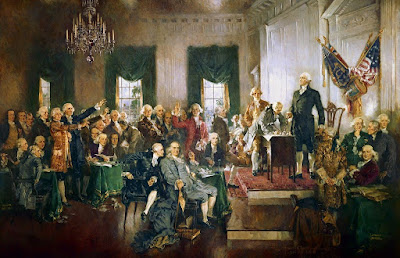
The constitution was signed in 1787 causing a dramatic change in campaign tactics. Now there would be no drunken crowd to sway at the local courthouse. Now there was an electoral college voting the state’s preference for president. Instead of Washington campaigning to convince the electorate that he was the right person for the presidency, the electorate campaigned to convince George Washington that he was the right person for the position.
Sept 17, 1787 - Constitutional Convention delegates signed the document
For example, on September 13, 1788, Henry Lee wrote in a letter to Washington, “Without you the govt can have but little chance of success…”
On September 22, Washington expressed his preference to decline the presidency in a letter to Lee. He wrote, “You will perceive, my dear Sir, by what is here observed (and which you will be pleased to consider in the light of a confidential communication) that my inclination will dispose & decide me to remain as I am…”
Another example is in the letter written by Alexander Hamilton in September 1788. He wrote “Independent of all considerations drawn from this source the point of light in which you stand at home and abroad will make an infinite difference in the respectability with which the government will begin its operations in the alternative of your being or not being at the head.”
In his response to Hamilton on October 3rd, 1788, Washington wrote “Now, if I am grossly deceived in myself, I should unfeignedly rejoice, in case the Electors, by giving their votes in favor of some other person, would save me from the dreaded Dilemna of being forced to accept or refuse.”
Alexander Donald, a leading tobacco merchant, wrote to Washington on February 28th, 1789 and encouraged Washington to accept the presidency. His letter stated “…still I am satisfied you cannot resist the unanimous wish of United America, especially if you could be brought to think as all other good men do, That The Happiness & Prosperity of the Thirteen United States, intirely depends on your acceptance of the President’s Chair.”
On April 1, 1789, congress finally had a quorum and counted the votes of the electoral college and Washington was elected unanimously.
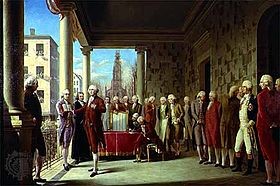
April 30, 1789 – Washington sworn in and gave his inaugural speech
Critical dates leading up to the swearing in of George Washington, President of the United States of America. December, 1754 – Fairfax County election - Payne knocks down Washington July 24, 1758 – Washington wins Frederick County election for the House of Burgesses June 25, 1787 – Constitution passed – 89 ayes, 79 noes Sept 17, 1787 – Constitutional Convention delegates signed the document June 21, 1788 – New Hampshire ratified and the Constitution became the official government document February 4, 1789 – States electors voted for Washington unanimously April 1, 1789 – New government commenced April 6, 1789 – Quorum arrives in congress and counted the Electoral College votes April 14, 1789 – Charles Thompson arrives at Mt. Vernon and informs Washington that he has been selected to be the first president of the U.S. April 30, 1789 – Washington sworn in and gave inaugural speech in NYC May 29, 1790 – Constitution is ratified by Rhode Island, the last of the 13 states.
Weems, Mason L., The Life of Washington, John Howard Library Book, pp187-189
"to err is natue; to rectify the error is glory"
From The Life of Washington, by Mason L. Weems, pp188-189.
That dearest and best of all appellations, "the father of his country," was the natural fruit of that benevolence which he so carefully cultivated through life. A singular instance of which we meet with in 1754, and the 22d year of age.
He was stationed at Alexandria with his regiment, the only one in the colony, and of which he was colonel. There happened at this time to be an election in Alexandria for members of assembly, and the contest ran high between colonel George Fairfax and Mr. Elzey. Washington was the warm friend of Fairfax, and a Mr. Payne headed the friends of Elzey. A dispute happening to take place in the courthouse-yard, Washington, a thing very uncommon with him, got warm, and, which was still more uncommon, said something that offended Payne; whereupon the little gentleman, who, though but a cub in size, was the old lion in heart, raised his sturdy hickory, and, at a single blow, brought our hero to the ground. Several of Washington’s officers being present, whipped out their irons in an instant, and it was believed that there would have been murder off-hand. To make bad worse, his regiment, hearing how he had been treated, bolted out from their barracks, with every man his weapon in his hand, threatening dreadful vengeance on those who had dared to knock down their beloved colonel. Happily for Mr. Payne and his party, Washington recovered, time enough to go out and meet his enraged soldiers; and, after thanking them for this expression of their love, and assuring them that he was not hurt in the least, he begged them, as they loved him or their duty, to return peaceably to their barracks. As for himself, he went to his room, generously chastising his imprudence, which had thus struck up a spark, that had like to have thrown the whole town into a flame. Finding on mature reflection, that he had been the aggressor, he resolved to make Mr. Payne honourable reparation, by asking his pardon on the morrow! No sooner had he made this noble resolution, then recovering that delicious gaiety which accompanies good purposes in a virtuous mind, he went to a ball that night, and behaved as pleasantly as though nothing had happened! Glorious proof that great souls, like great ships, are not affected by those little puffs which would overset feeble minds with passion, or sink them with spleen!
The next day he went to a tavern, and wrote a polite note to Mr. Payne, whom he requested to meet him. Mr. Payne took it for a challenge, and repaired to the tavern, not without expecting to see a pair of pistols produced. But what was his surprise on entering the chamber, to see a decanter of wine and glasses on the table! Washington arose, and in a very friendly manner met him, and gave him his hand. “Mr. Payne,” said he “to err is nature; to rectify error is glory; I have had some satisfaction; and if you think that sufficient here’s my hand, let us be friends.”
Admirable youth! Noble speech! No wonder, since it charms us so, that it had such an effect on Mr. Payne, who from that moment became the most ardent admirer and friend of Washington, and ready at any time, for his sake, to charge up to a battery of two and forty pounders.
Election time is here - Washington's letter to Bushrod on our right to replace incumbents
“The power under the Constitution will always be in the People.
It is entrusted for certain defined purposes, and for a certain limited
period, to representatives of their own choosing; and whenever it is
executed contrary to their Interest, or not agreeable to their wishes,
their Servants can, and undoubtedly will be, recalled.”
(letter to Bushrod Washington, November 10, 1787)
Article posted in the Marin IJ honoring Washington's Birthday
Marin Voice: If Washington was in today’s race for the White House
Portrait of George Washington (Chicago Tribune) 2013
By Ray Lorber
Marin Independent Journal Posted: 02/21/16, 3:43 PM PST
What if George Washington was a candidate in the 2016 primary election?
To him, campaigning and running for office would foretell a personal and aggressive ambition. He would rather be committing his time and energy to the well-being of the people and the country.
But in today’s election process, he would have to campaign and master today’s media. His style would be different from what we see on our daily newscast. His campaigning style would exhibit his personal credo — deeds not words. Stop talking so much and take thoughtful action!
His past work experience would outshine the experience of the other candidates. Washington’s credentials include his role as a licensed surveyor at age 15, commanding officer in the French and Indian War, justice of the peace, member of the Virginia House of Burgesses, farmer, land developer, commander in chief of the armed forces during the American Revolutionary War, presiding officer of the Constitutional Convention, and twice unanimously elected to the Office of President of the United States of America.
While the other candidates would claim an extensive formal education, Washington would state emphatically and proudly that he was self-taught.
He would address his lack of a formal education by explaining that his father died when he was young and his mother could not afford to educate him. Then, he would observe that he read a great deal and surrounded himself with some of the most illuminated and brightest minds in the United States, such as Alexander Hamilton, Thomas Jefferson, Henry Knox and others.
Washington would then express his commitment to education in America, emphasizing that he continuously urged Congress to establish a national institution of higher learning.
As a candidate, Washington would state his principles and ideals as a farmer, ideals that drove him to learn, adapt and reinvent himself. He would emphasize that as a farmer he pursued the most innovative technology of the times. He would proclaim that you cannot stop technology; change is inevitable
You must read, pursue your education and prepare to become a self-made and fully-realized person, he would say.
He diversified the operation of Mount Vernon and his other farmlands, by growing the grain for his grist mill, owning the ships to transport his products, pursuing commercial fishing, and running a distillery.
He would be a strong supporter of competition, diversification, and free enterprise to improve products and reduce prices.
He would not affiliate with a political party because he believed that they provoked divisiveness and did little but raise the interests of the party rather than that of the nation.
As for taxes, he encouraged everyone, rich or poor, to pay the taxes they owed. He felt that each person had the responsibility to support his government and enable it to become financially strong.
His demeanor would reflect his polite, gentlemanly manner. He would be known throughout the country for his reputable character and his belief that honesty was always the best policy.
Washington would be concerned about political apathy and encourage people to become engaged to protect their franchise.
He would express pride in a government that supported the belief that all men are created equal and that man can and must govern himself.
His campaign would demonstrate his values and guide citizens towards a more perfect Union. His speeches would proclaim that the country should move forward in a tolerant, considerate, financially-conservative and rational manner.
Ray Lorber of San Rafael is the author of the book, “George Washington’s Providence.” He is active in San Rafael civic affairs and wrote this column to mark Washington’s 284th birthday on Feb. 22.
Washington reluctantly decided to attend the Constitutional Convention
Fifty-five year old George Washington, yielding to the call of his fellow countrymen, left the felicity of his beloved Mount Vernon to journey to Philadelphia and into the challenging world of nation building.
Washington’s decision came after a scrupulous appraisal of his personal thoughts and feelings. He questioned the efficacy of the proposed Constitutional Convention, but, with a commitment to do the right thing for the betterment of the country, he agreed to attend.
Washington doubted that the Constitutional Convention would be successful. He was aware of the diverse opinions on how to correct the ineffectiveness of the Continental Congress and he expected a very contentious Constitutional Convention. With his friends and acquaintances he discussed the potential for failure and his reluctance to attend. In a letter to John Jay he wrote, ”This, however Constitutionally it might be done, would not, in my opinion, be expedient; for delicacy on the one hand, and Jealousy on the other would produce a mere nihil.”
His friends thought that his presence would yield success and were encouraging him to attend. Henry Knox explained that Washington’s presence “…would confer on the assembly a national complexion, and that it would more than any other circumstance induce a compliance to the propositions of the convention.” Benjamin Franklin wrote that he had, “ … Hopes of seeing you here at the Convention, being persuaded that your Presence will be of the greatest Importance to the Success of the Measure.”
Although apprehensive, he was now embarking on a journey to assist in the formation of a more effective, centralized government. On the day of his planned departure, the weather was “squally with Showers” and he was unable to venture out. At sunrise the following day he began his journey. His first stop was to lunch at Richard Henderson’s house in Bladensburg, Maryland. That evening he stayed at Thomas Snowden’s house at Montpelier. He went to bed early , “feeling very severely a violent hd. ach & sick stomach…” When he awoke in the morning he felt fine and resumed his journey to the Philadelphia. The trip from Mount Vernon to Philadelphia took 5 days.
The citizens of Philadelphia celebrated Washington’s arrival. He was escorted into town by the lighthorse commanded by Colonel Miles, crowds cheered, church bells rang and he was greeted by Doctor Benjamin Franklin.
The proceedings of the Convention were scheduled to commence on the 2nd Monday of May, which was the 14th. But with an insufficient number of states in attendance the proceedings were delayed.
On Friday the 28th of May, 1787, seven states attended the Convention and a quorum was achieved. On the following Monday, a rule was passed that prevented Convention activities from being discussed outside of its doors. George Washington, disregarded this understanding, when in a letter to his brother on June 3rd he wrote that “the sentiments of the different members seem to accord more than I expected they would, as far as they have gone.”
On September 28 the Constitution was submitted to the states for ratification. To ratify the Constitution nine of the thirteen states needed to approve it. The first to vote approval was Delaware. On June 21, New Hampshire became the ninth state to ratify the Constitution. With nine states voting to approve there was sufficient support to be ratified. During the next two months, New York and Virginia approved the Constitution solidifying the states backing for a strong federal government.
GWPPS GW to John Jay 5:79 nihil is a thing of no value.
Ibid. Henry Knox to GW 5;95
Ibid. Benjamin Franklin to GW 5:122
GWD Donald Jackson and Dorothy Twohig, editors 5:152
Ibid 5:153
Ibid. 5:155
GWPPS GW to George Augustine Washington 5:217
My question to the George Washington's Legacy discussion panel
My question to the panel of prominent historians Michael Beschloss, Susan Dunn, PhD and Ed Larson, PhD was as follows:
With respect to the character of George Washington, I asked the panel to discuss their thoughts on the following predicament.
With the Jay Treaty negotiations, Washington sent John Jay to Great Britain to negotiate a treaty after the Revolutionary War. Meanwhile Washington reassured his Secretary of State, Thomas Jefferson that that he was negotiating with the French not the English.
When Jefferson accidentally found out that Washington had sent Jay to Great Britain to negotiate, he lost confidence in the leadership of Washington and pursued a campaign to bring down Washington.
I asked the panel to discuss Washington using misinformation on Jefferson in light of the highly respected character of Washington.
The panel's consensus was that Washington was in a predicament. He knew of the public influence that the francophile Jefferson could muster, but he felt that he had to risk that in light that the British still retained their forces on the western front of the United States. They were there to prevent the Americans from conquering the West. With the Jay Treaty the British would abandon their interest in the western part of the United States.
Washington subsequently lost a significant amount of his prestige among the Americans as a result of the Jefferson campaign to bring him down.
After a significant amount of negotiaton, Washington received a one vote majority and the Jay Treaty was approved by the Senate. Having taken a severe beating by the press, Washington returned to Mount Vernon to recover from the onslaught.
That is the risk of leadership. Doing what is right even at the price of having your character damaged.
George Washington's Legacy: A Review of Presidential Leadership
George Washington’s Legacy: A Review of Presidential Leadership
I attended the panel discussion featuring prominent historians Dr. Edward Larson, Dr. Susan Dunn, and Mr. Michael Beschloss. Shaped by the tremendous work of noted political scientist and leadership scholar, Dr. James MacGregor Burns, the panel will discuss the legacy and precedents set by the leadership of George Washington as the country’s first federal head. Where following presidents have taken Washington’s leadership lessons and implications on how we study, evaluate, and validate the leadership of our political leaders will be discussed.
The event was scheduled for Thursday, April 9, 2015 at the Robert H. and Clarice Smith Auditorium at Mount Vernon.
This discussion provided a foundation and a wealth of information for my next book on George Washington.
George Washington's Providence included in the library at the University of Maryland
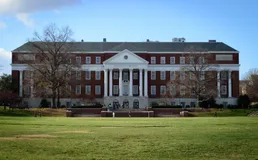
February 27, 2015, an autographed copy of George Washington's Providence has been accepted for inclusion in the McKeldin Library, University of Maryland, College Park, MD.
The University of Maryland is my alma mater. I am honored that the University has added George Washington's Providence to their prestigious collection.
Washington's courage and leadership should be remembered today
Marin Independent Journal
Marin Voice: Washington’s courage and leadership should be remembered today
By Raymond G. Lorber
Posted: 02/22/15, 6:17 PM PST |
Today, Feb. 22, is George Washington’s 283rd birthday. You may be asking, “Why is this significant?”
For one, Washington victoriously led an undernourished and poorly clothed army against the most powerful army in the world. In tribute to his success, he was honored with the title “The Father of our Country.” His men followed him into battle with alacrity knowing that they had a leader who was committed, trustworthy and brave. He stood his ground against the most fearsome professional soldiers that the British army could muster. His legend was built upon numerous heroic, life threatening confrontations with the enemy. Following is a list of some of the more notable examples of his bravery during the Revolutionary War.
As Commander-in-Chief of the Continental Army, General George Washington charged into canon fire while leading his troops in the Battle of Trenton.
He turned his retreating troops and led them into enemy fire and defeated the British at the Battle of Princeton.
He faced down the rifle of Capt. Patrick Ferguson during the Battle of Brandywine.
Washington rode to the battle front to command Lt. Col. Nathaniel Ramsay to hold the line against the rapidly advancing British Regulars during the Battle of Monmouth Courthouse.
He dug trenches while under fire during the Yorktown Siege.
A second reason is that he was selected president of the 1787 Constitutional Convention. This was a very contentious convention, consisting of members advocating conflicting opinions on how to go about correcting the problems that the Continental Congress was not able to resolve. Washington was encouraged to attend by his peers who strongly believed that his presence would solidify the success of the convention. With Washington’s leadership, the convention provided a Constitution that has been a steadfast democratic standard for the free world for 226 years.
A third reason is that he is the only president who has been elected president unanimously by the Electoral College. And the Electoral College voted unanimously for reelecting Washington to a second term. No other candidate for president has had the respect required to gain total support of the Electoral College.
A fourth reason is that Washington‘s leadership and direction has sustained the executive office to this day. He established the system of cabinet officers. Washington, with the use of executive orders, developed a strong executive branch of the federal government.The Constitution assigned to the president the responsibility to protect the country while Congress was authorized to declare war and the Senate was given the responsibility to approve treaties. Washington, unable to get the required support from Congress, used the power of executive orders to send troops to defeat invading Indians during his first term in office. During his second term, he used the same powers to lead the army against the threatening Western Pennsylvania farmers during the Whiskey Rebellion. And he issued the Proclamation of Neutrality that kept the United States out of the European wars.
Washington’s leadership and executive skills enabled him to persuade the Senate to support the bitterly contested Jay’s Treaty.
He was highly respected for his character and for his dedication and commitment to our country. In 1790, the people of the United States admired their president and they deeply mourned his passing in 1799.
Today, we celebrate the 283rd birthday of the “Father or our Country” and express our thanks for his dedication and commitment to the founding of the United States of America, his outstanding accomplishments and considerable contributions to the formation of our great nation.
Raymond G. Lorber of San Rafael is the author of “George Washington’s Providence.”
Presentation at Dominican University
Dominican University 50 Acacia Avenue San Rafael, CA
American History Class
Guzman Hall, Room 113
Professor Bernard Von Bothmer
Monday, October 27, 2014
Discussion on "Who is George Washington?"
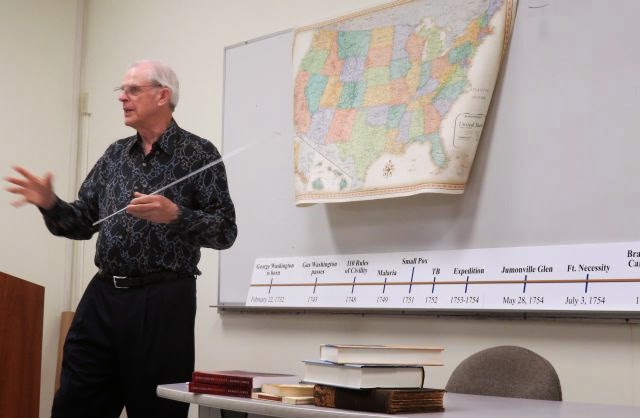
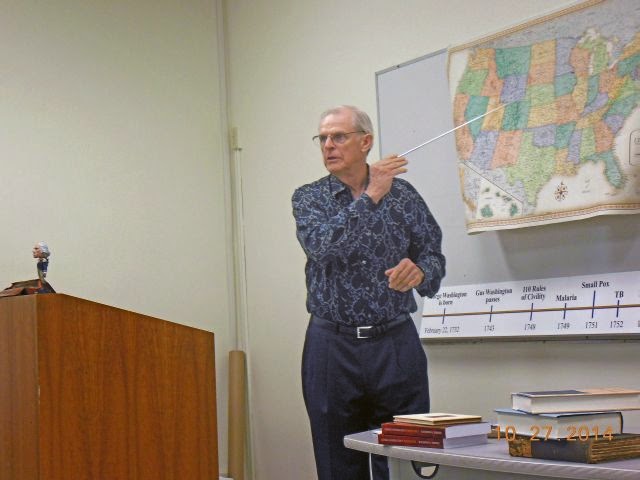
Miller Creek Middle School Comments
Another special thank you and expression of appreciation to Janai Meschery and Ted Breece for inviting me to return to present to this year's 8th grade classes at Miller Creek Middle School and for their kind words of appreciation following this year's presentation.
Miller Creek Middle School George Washington Presentation December 2, 2014
HI Ray,
Thank you so much for coming today and sharing your wealth of knowledge with our students. It is great for us to learn new details as well and we really appreciate your passion and dedication to your subject. Sincerely, Ted Breece Janai Meschery
A special thank you and expression of appreciation to Janai Meschery and Ted Breece for providing me the opportunity to present to four of the 8th grade classes at Miller Creek Middle School. The skill they demonstrated in educating the 120 students who participated in the presentation is admirable.
Miller Creek Middle School
Comments of the Students
George Washington Presentation
February 27, 2014
Summarized by
Janai Meschery and Ted Breece
1. What They Liked:
a. How you told stories of Washington in and out of the military, and how he was an important asset during that time period.
b. How you spoke clearly, with volume, and with words middle school students could understand.
c. How you were humorous during the story telling.
d. How the presentation was full of true facts about Washington.
e. How you gave the students a piece of paper when they answered a question correctly.
f. How you constructed the outline of your presentation.
g. How you added in information that the students did not know about Washington.
h. How you had great answers for all of their questions.
i. How you had pictures and books to elaborate on certain points.
j. How you stopped and let them take notes in between stories.
k. The discussion of Washington’s traits/qualities, and how you separated it into sections so it was easier to follow.
l. How you kept calm while talking to the group of students.
m . How you gave information on the French/Indian War with many details about it.
n. The background information you provided about Washington.
2. What they would like added:
a. Information on Washington’s family life and other specific experiences and accomplishments as president.
b. More little stories about Washington, especially funny ones.
c. More information about Washington’s relationship with his horses, and slaves.
d. More information on your own book.
e. Rephrasing of your questions so everyone could participate in the discussion, and or have more interactive things to do.
f. Wish you could of talked a bit more about the Revolutionary War, and the myths and lies that were started about him.
g. More information about Washington’s childhood.
h. Information on his farewell address and what he warned the U.S. about.
i. More visuals (larger size so all can see) would add to the presentation, but not video or a slideshow.
3. Questions they still have:
a. Why have many people kept track of key points in George Washington’s life?
b. Why has he gone down in history as so famous?
c. How was Washington able to fight off all three diseases? Did he ever come really close to death?
d. Why hasn’t he ever gotten injured during battle?
e. Who were the most influential people in Washington’s life?
f. Where were the reinforcements when Washington needed them to chase the French out?
g. Did Washington have any important accomplishments when he was young, our age? What was he like as a kid and teen?
h. Why did it seem like Washington’s troops gave up and started to retreat so often during battle?
i. How was Washington unanimously elected twice?
j. Who were Washington’s second hand men, the people he depended on the most in and out of battle? Did he have good friend?
k. Which issues were the most important to Washington?
l. Where is Washington buried?
m . Why is Washington riding his white horse (mostly, but sometimes the brown) and placed in the middle of the battle in so many paintings?
Past Speaking Engagements
Past Speaking Engagements 2013 - 2014
Raymond G. Lorber Author: George Washington's Providence
HI Ray, December 1, 2014 Thank you so much for coming today and sharing your wealth of knowledge with our students. It is great for us to learn new details as well and we really appreciate your passion and dedication to your subject. Sincerely, Ted Breece Janai Meschery Miller Creek Middle School
Sons in Retirement (SIR) book discussion
Sons in Retirement (SIR) Indian Valley Branch #68
October 14, 2014 Even though I had read your book, I just want to let you know that I thoroughly enjoyed your talk this morning. Your delivery was excellent, and I was extremely impressed with the way you made all the vignettes come alive. I have listened to a lot of presentations made to the SIRS group (they can be a tough crowd!) and I can assure you that you held everyone's attention.
Well done!
David Crowne
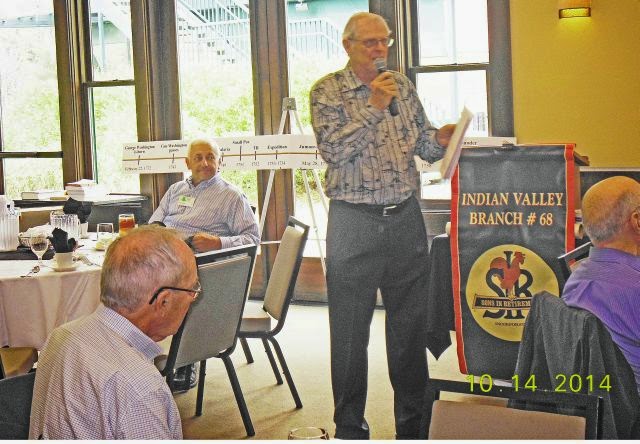
From: Charles Salinas
Oct 15, 2014
To: Ray Lorber
Captivating presentation!
You brought his exploits and their importance to the birth of this country to life. Nice touch on freeing the slaves when Martha passed on.
Thanks for enlightening us about George.
Charlie

St. Raphael School - Ms. Reyff's and her students' letters
March 5, 2014, Ash Wednesday, presentation to the 8th grade class at St. Raphael School in San Rafael, California.
The presentation provided a review of the personal characteristics of the Father of Our Country. The students enthusiastically participated and readily demonstrated their interest in learning more about George Washington.
A personal thanks to teachers Sydney Reyff and Gail Pirot for enabling me to share the knowledge that was acquired during the twelve years of research and eventual publication of George Washington's Providence.
Following are the class' letters that offer a review of my presentation.
October 14, 2014 Even though I had read your book, I just want to let you know that I thoroughly enjoyed your talk this morning. Your delivery was excellent, and I was extremely impressed with the way you made all the vignettes come alive. I have listened to a lot of presentations made to the SIRS group (they can be a tough crowd!) and I can assure you that you held everyone's attention.
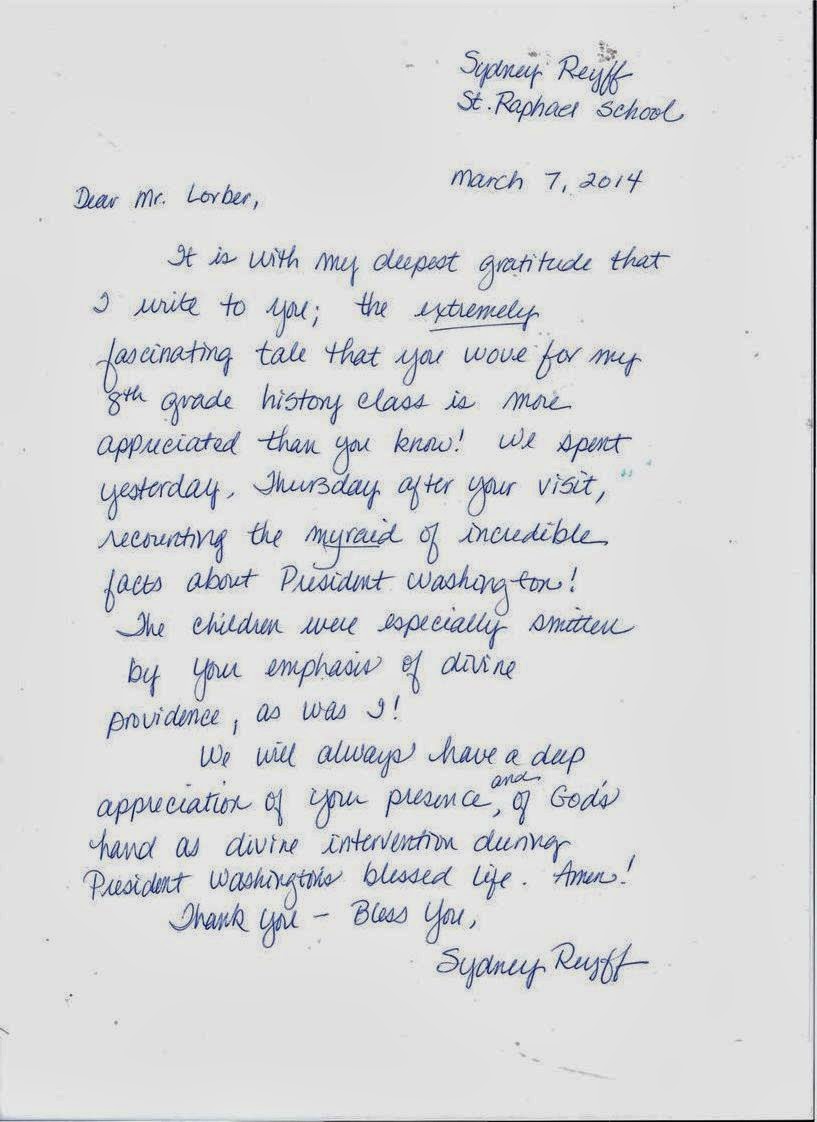


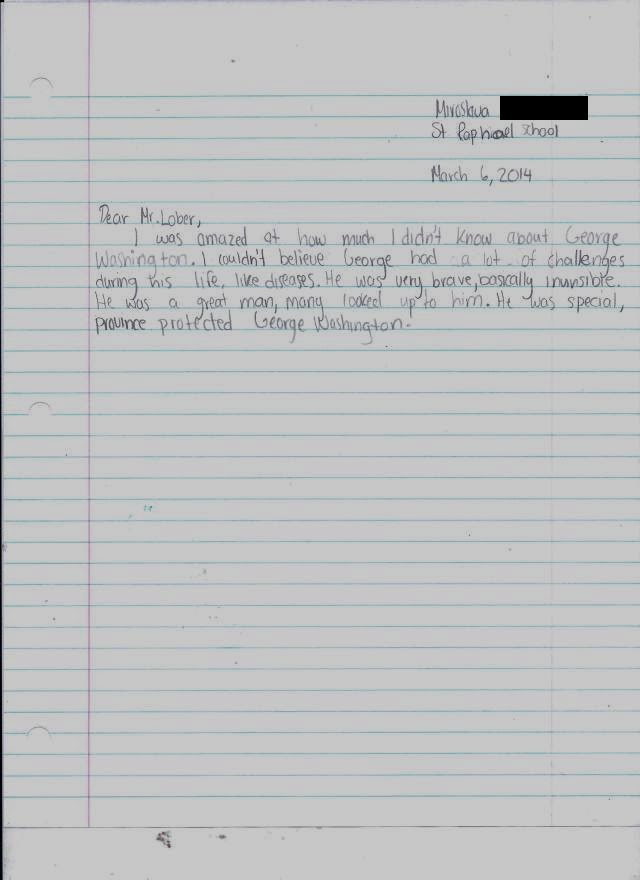
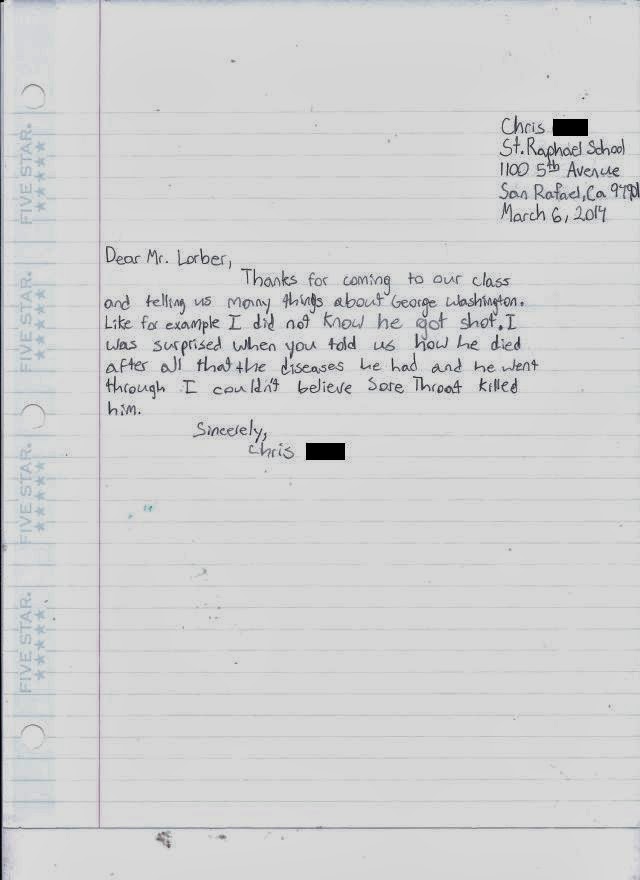
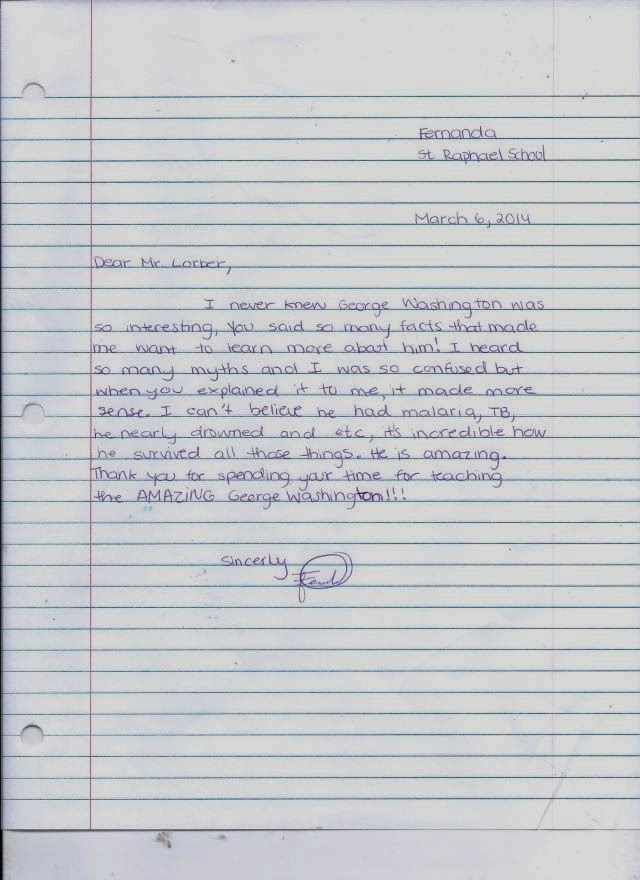
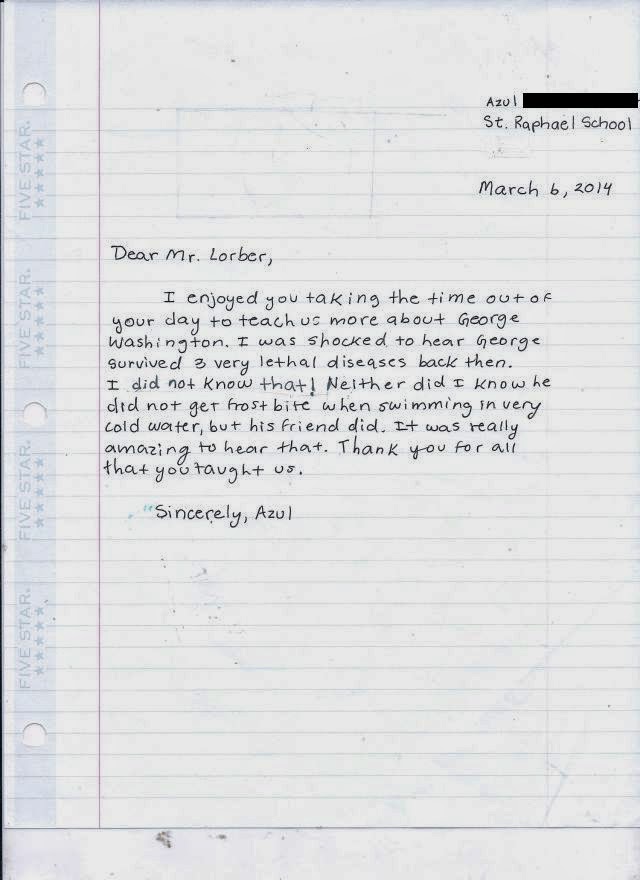
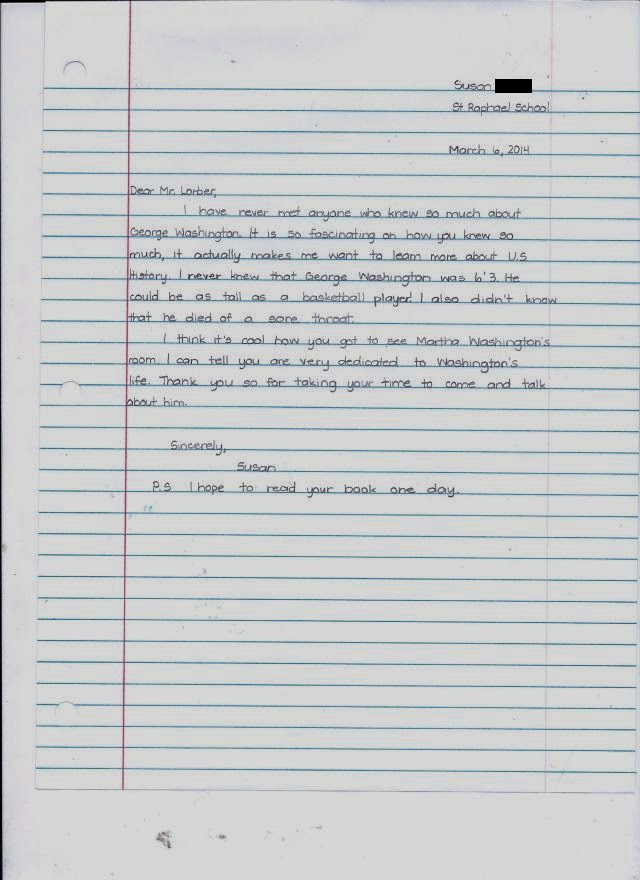
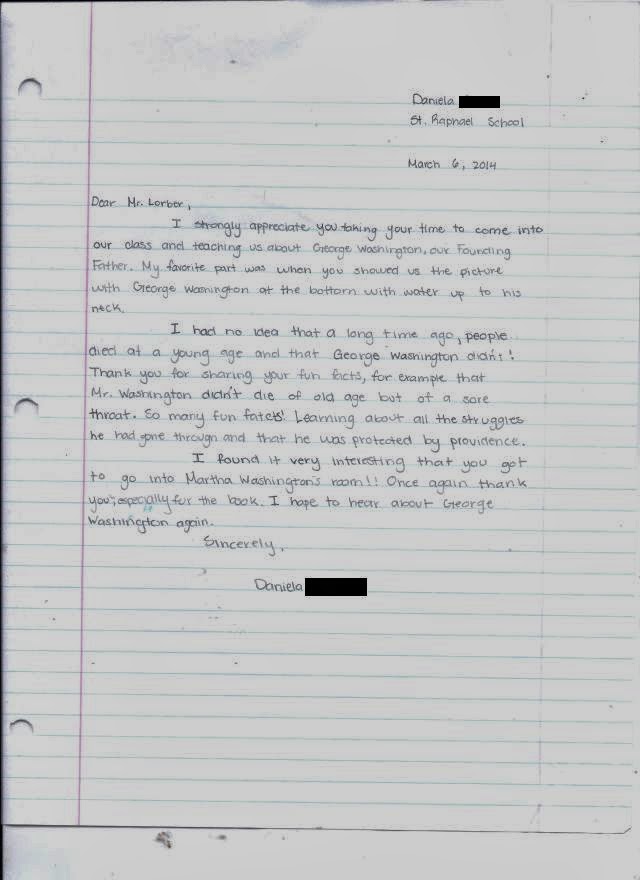
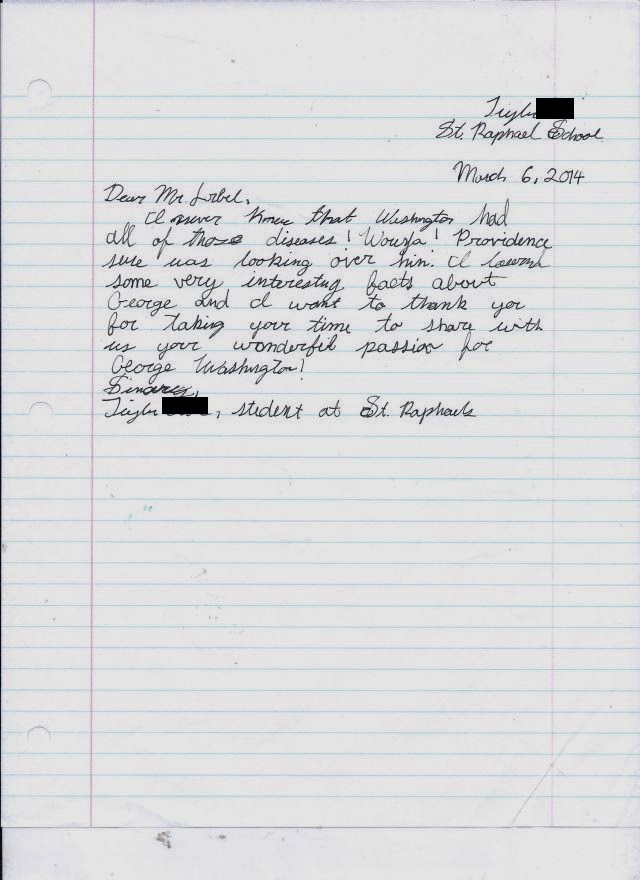
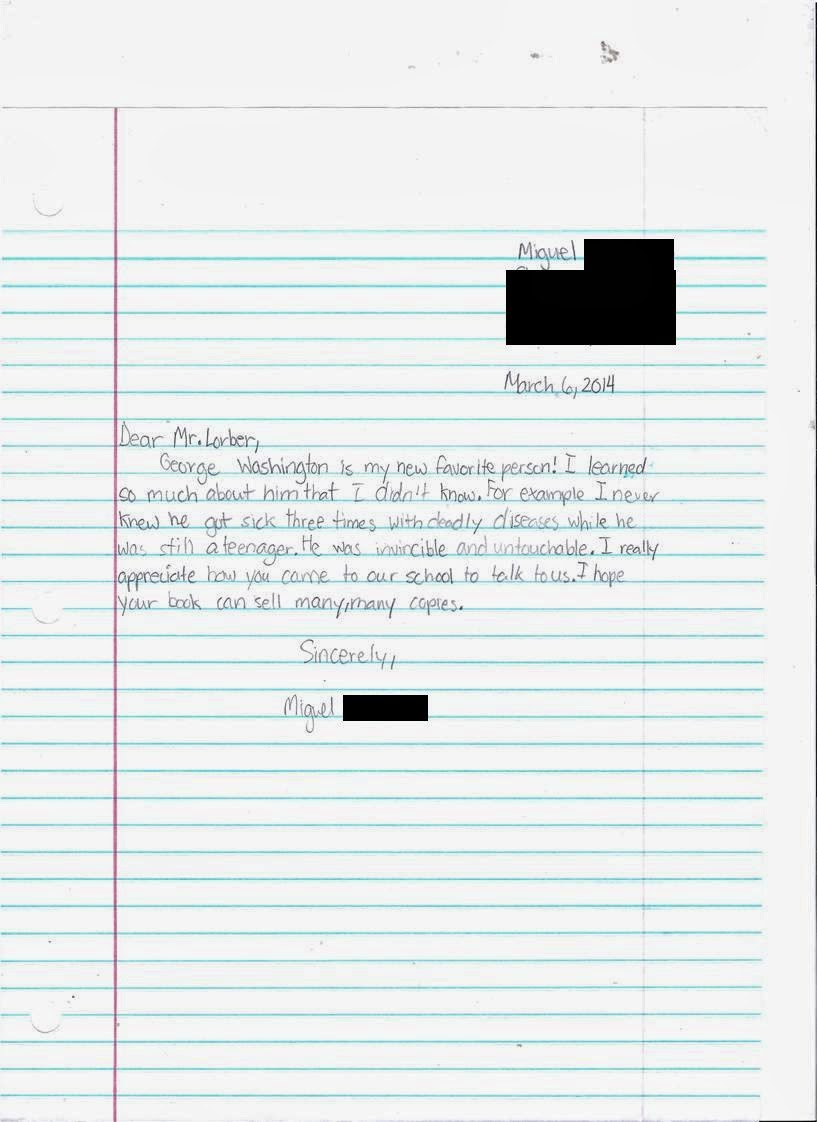
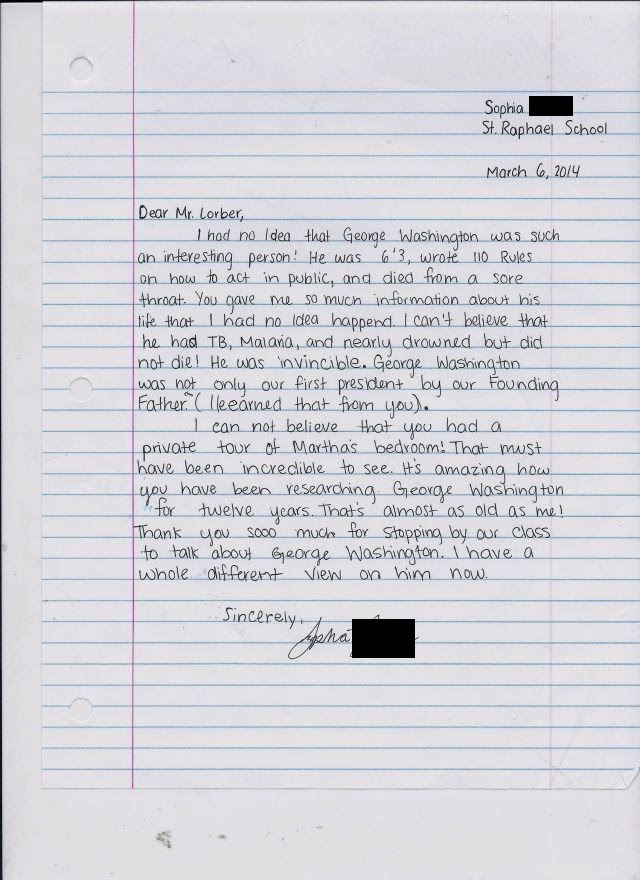
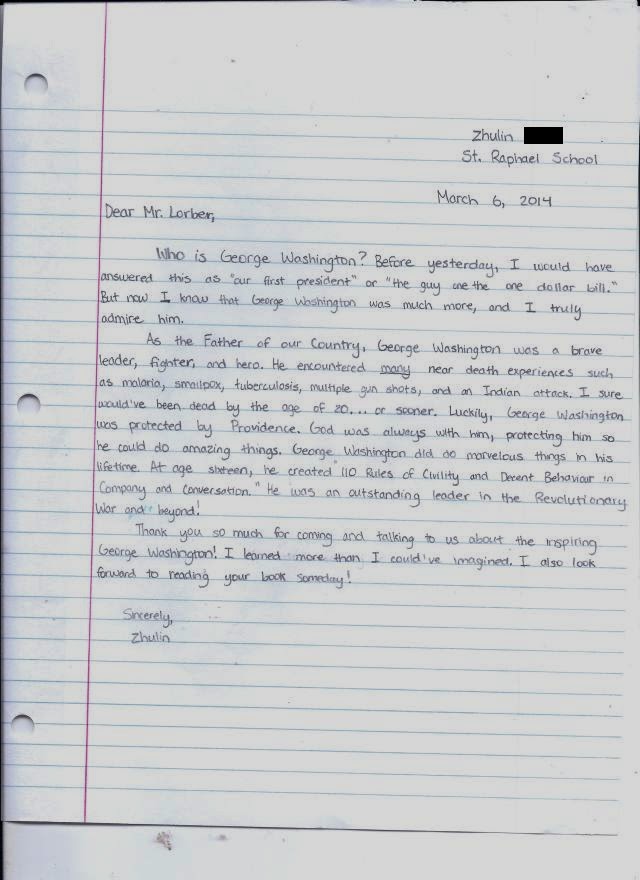

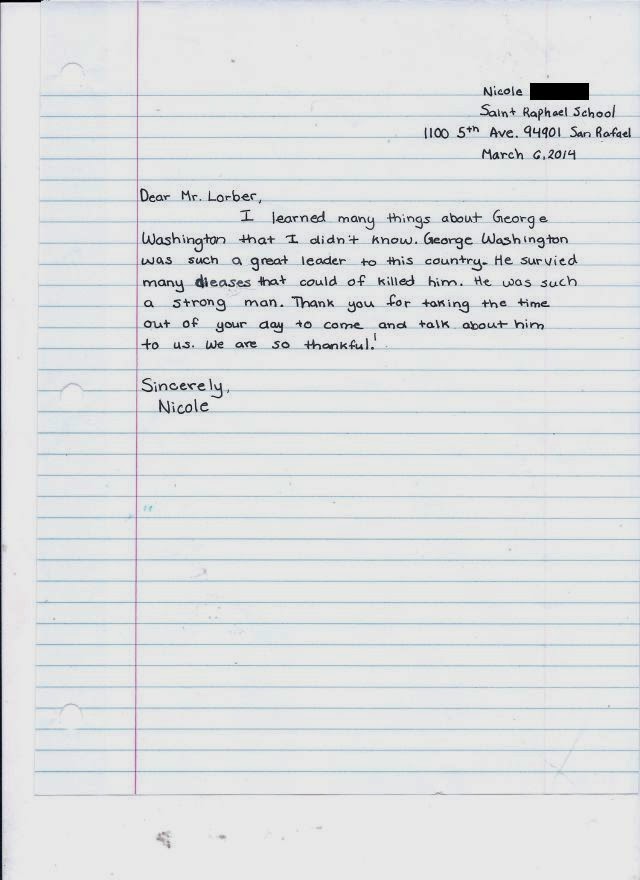
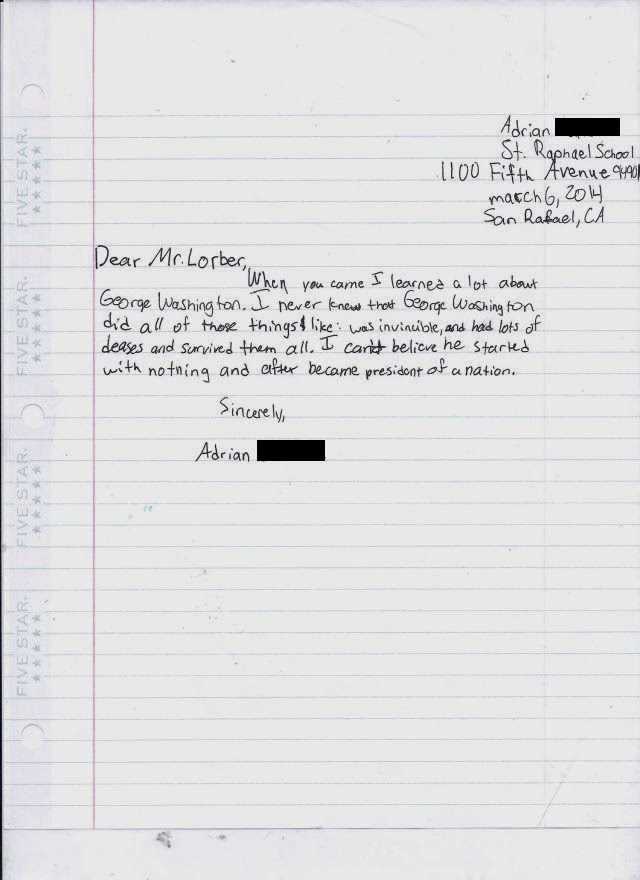
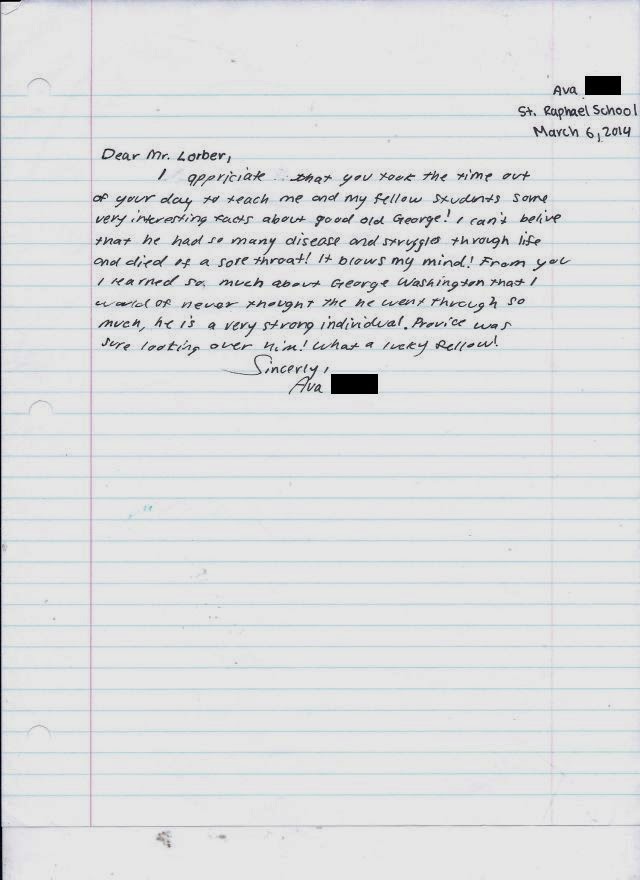
Marvelous Marin Breakfast Club Presentation
Marvelous Marin Breakfast Club
San Rafael Joe's 931 4th Street San Rafael, CA
Presented on Thursday, July 10, 2014 Discussion on George Washington's Providence.
Marin Masonic Lodge Presentation
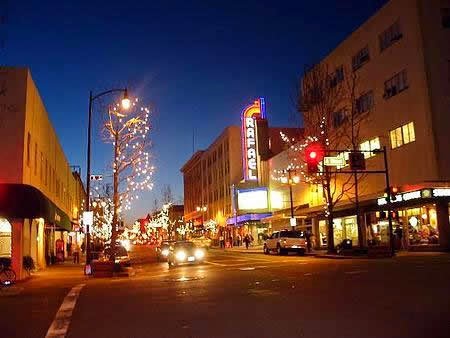
Marin Masonic Lodge
1010 Lootens Place San Rafaael, CA 730-3813
6:30 pm Monday, June 16, 2014
Discussion on George Washington's Providence
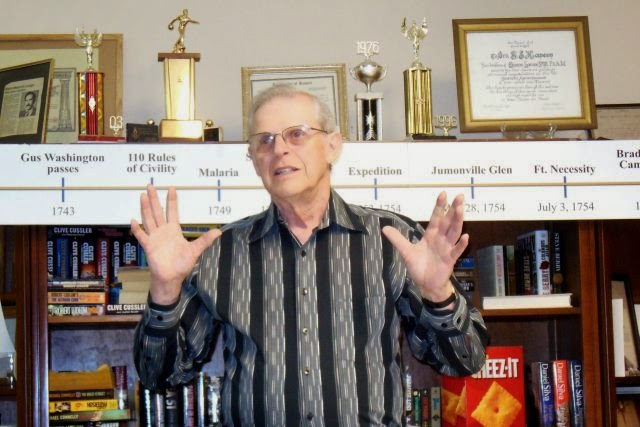
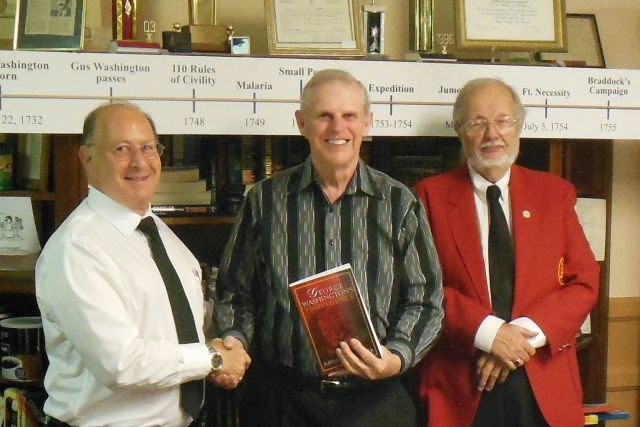
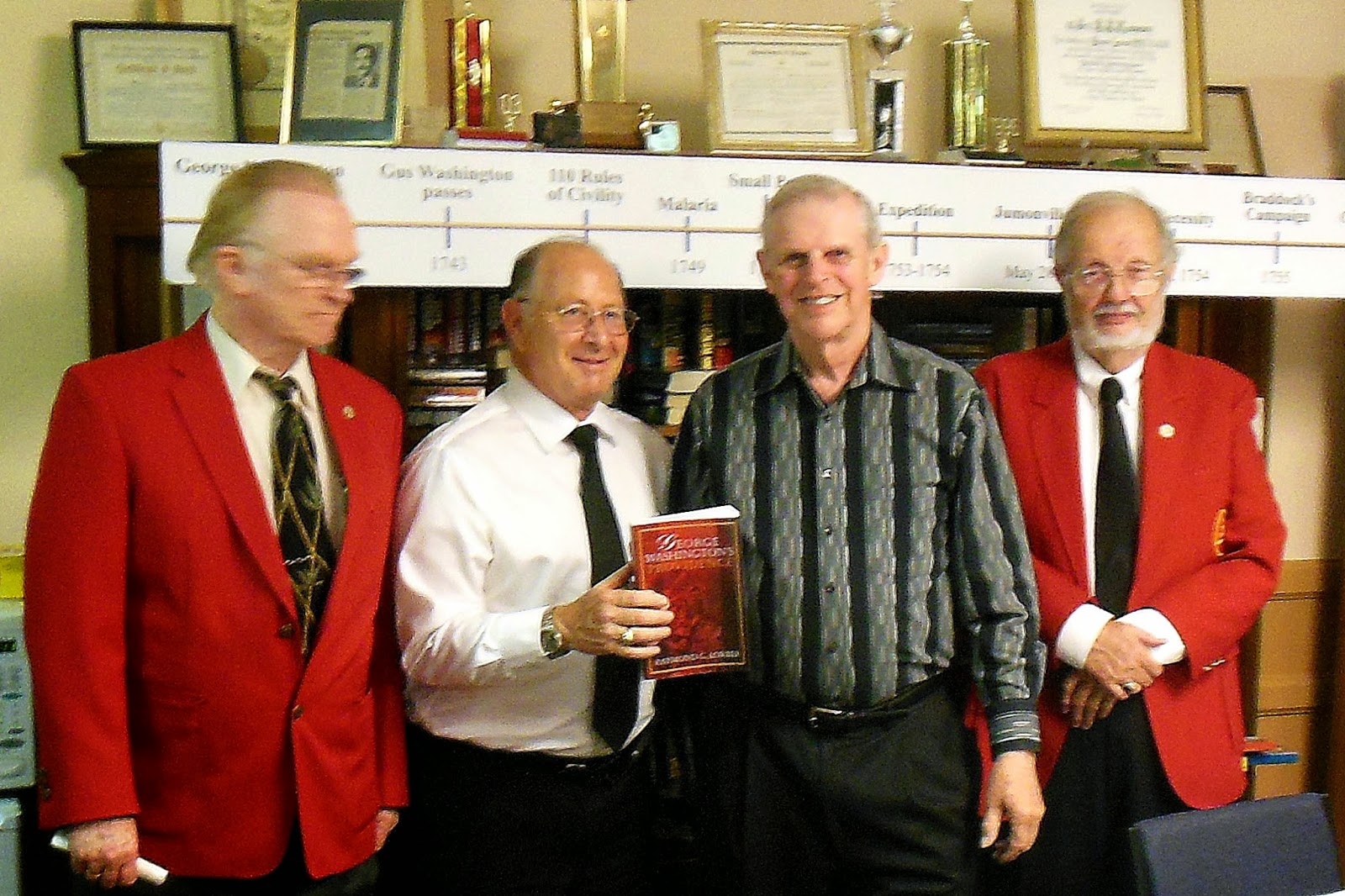
St. Marks School Presentation
Mark Day School (aka. St. Marks School)
39 Trellis Drive San Rafael, CA 415-472-8000
May 30, 2014
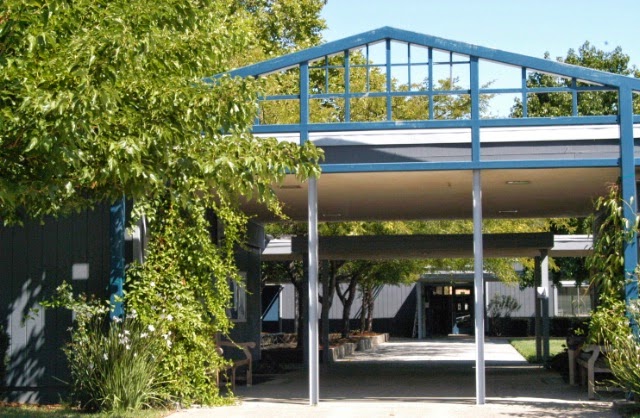
"Who is George Washington?"
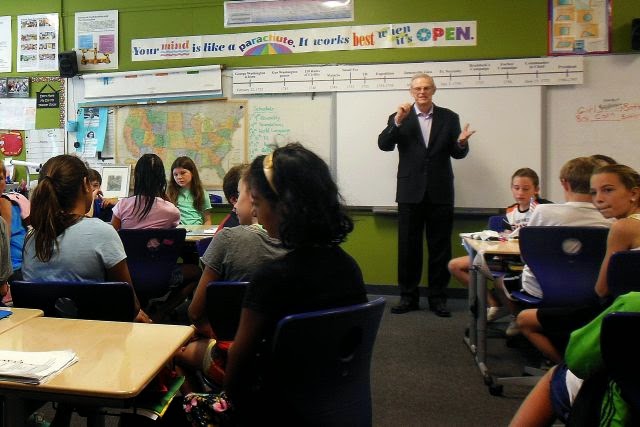
5th Grade Classes
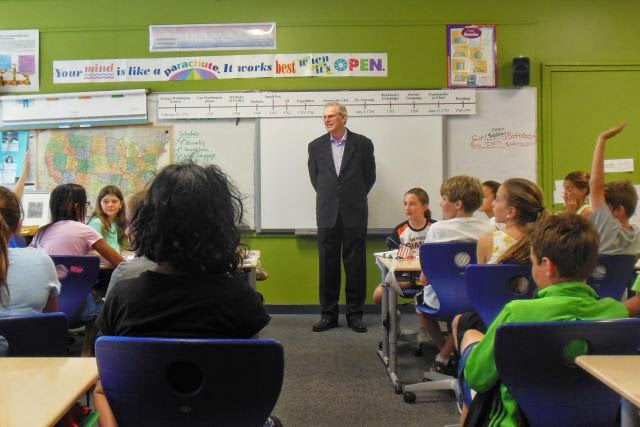
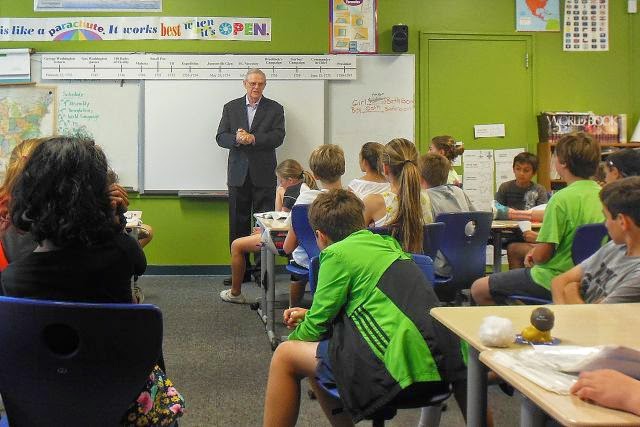


San Rafael Public Library
1100 E Street San Rafael, CA 415-484-3321
Monday, May 5, 2014 6:45 - 8:00 pm
Author Chat on George Washington's Providence.
"How did George Washington survive so many illnesses, battles and brushes with death?"
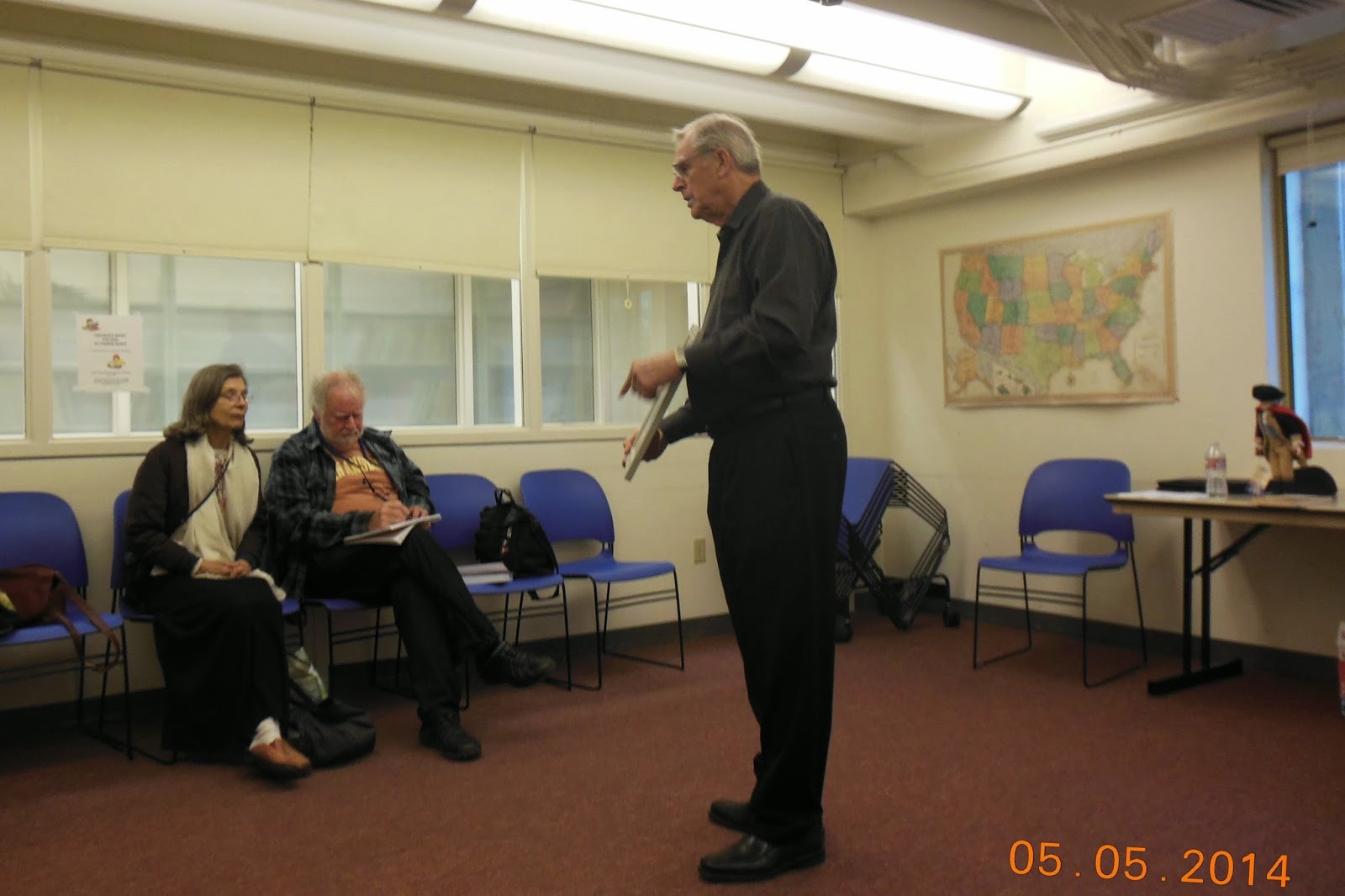
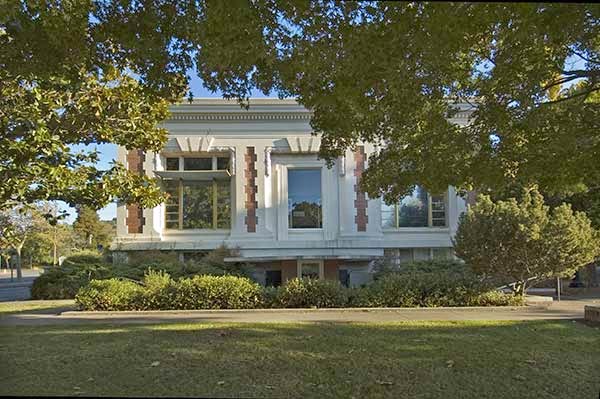
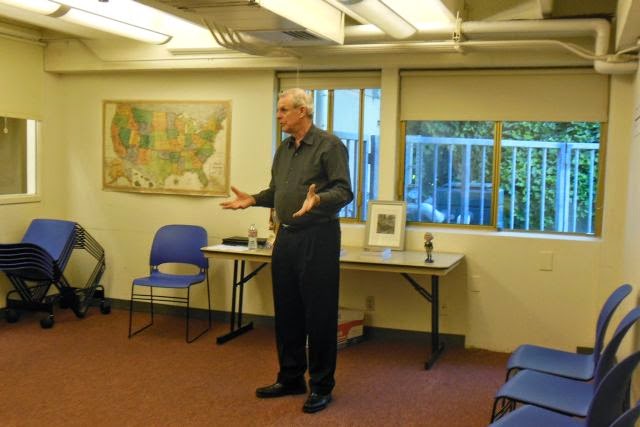
St. Raphael School - Wednesday, March 5, 2014
St. Raphael School
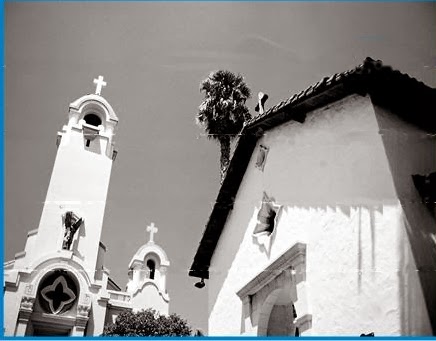
Wednesday, March 5, 2014
Who is George Washington?
Guest Lecturer
Raymond G. Lorber Author
George Washington's Providence
8th Grade Class
Teachers Sydney Reyff Gail Piro
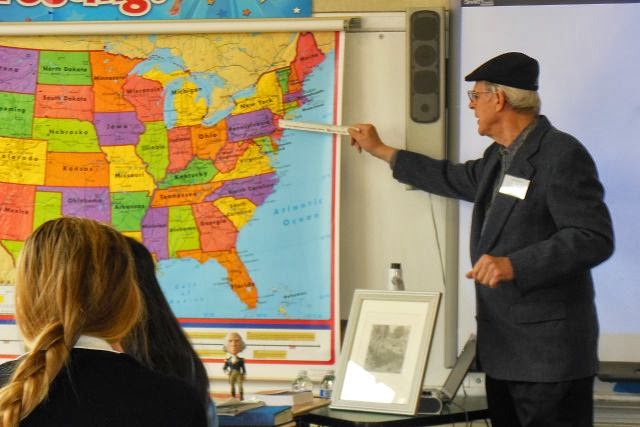
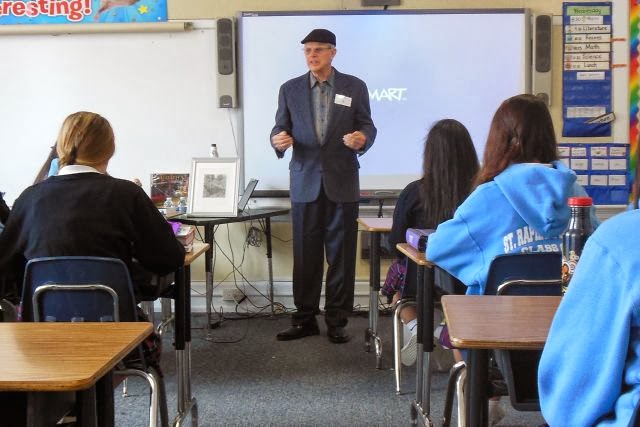
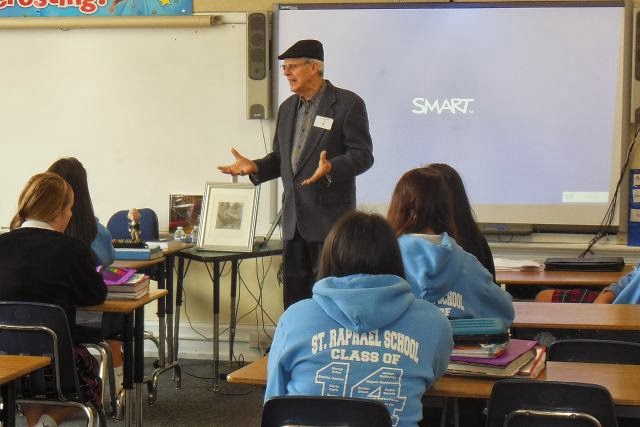
San Rafael Public Library - Author Chat with Raymond G. Lorber
George Washington’s Providence
Author Chat with Raymond G. Lorber
San Rafael Public Library, 1100 E Street, San Rafael Monday, May 5th, 2014, 6:45 p.m.
How did George Washington survive so many illnesses, battles, and brushes with death? Local author, Raymond G. Lorber, discusses the amazing faith and resilience of the first president, based on evidence found in Washington’s own letters.
Kirkus Reviews has called this book “a solid piece of historical research...”
Against all odds, George Washington fostered the world's first modern democracy and became renowned as the father of our country, at a time when the median age was sixteen. Remarkably living to the age of sixty-seven, Washington's life was riddled with multiple life-threatening diseases and countless charges into enemy fire. With a shocking resiliency and remarkable hardiness, Washington fought fatal infections and opposing armies with a steadfast belief that a protecting and guiding Providence would lead him to fulfill his destiny of greatness. Emboldened by Providence and a conviction that he was to accomplish great endeavors, Washington set forth to lead America out of a world of monarchy and colonialism and into the new reality of constitutional freedom. (description from the back cover of the book).
This event takes place in the Meeting Room at the Downtown San Rafael Public Library. For more information, please call (415) 485-3321.
Marin Independent Journal - February 24, 2014
Marin Voice: What would George Washington do?
By Raymond G. Lorber Guest op-ed column
Posted: 02/24/2014 05:31:00 PM PST
TODAY'S HEADLINES frequently broadcast news of our community protesting the decisions made by our elected officials. The anxiety is expressed at all levels of government — federal, state, county and city.
As a scholar of George Washington, I find myself pondering "What would the father of our country do?"
George Washington on many occasions endured heavy criticism from the citizens of our country. In spite of this conflict, George Washington was a leader who victoriously led an army of protesting men who were poorly clothed, malnourished, with limited weaponry through numerous battles against superior forces. He presided over a disputing Constitutional Convention and appeased a contentious House of Representatives while defining the executive branch of government.
What was so special about George Washington that enabled him to lead so effectively?
I suggest that it was his attention to character.
Throughout his life, he worked hard on improving his character. Ever since writing the words in his "110 Rules of Civility" notebook — at the age of 16 — he demonstrated that character was a key ingredient to leadership. Those who knew him recognized his commitment to honesty, fairness, morality and principle— they trusted him. That is why they followed him into battle, selected him to reside over the Constitutional Convention and why the electoral college twice elected him unanimously to the presidency.
Washington was known for making the reputable, not the expedient, choice in difficult circumstances. He decided against retaining absolute power on multiple occasions.
Following are two examples of his strongly-principled stance when confronted with tough, far-reaching decisions:
In 1789, the country was in disorder — the colonies and the Continental Congress failed to pay the soldiers back wages and the banks were repossessing their farms and homes. Washington was reluctant to assume the office of the presidency. As he exclaimed, "I can assure you ... that my movements to the chair of government will be accompanied with feelings not unlike those of a culprit who is going to the place of his execution."
He understood that he was selected for the presidency because the people believed in his integrity and good name. He wrote to his friend General Henry Knox, "I am sensible, that I am embarking the voice of my Countrymen and a good name of my own, on this voyage. ... Integrity and firmness is all I can promise — these, be the voyage long or short; never shall forsake me although I may be deserted by all men."
And to James Madison, the author of the Constitution, he wrote, "As the first of everything in our situation will serve to establish a precedent it is devoutly wished on my part, that these precedents may be fixed on true principles."
Today's elected officials would do well to follow Washington's advice and "... pay close attention to the expectations of others," while adhering to the highest principles of service.
I suggest that if they did so, their constituents would be better served.
Raymond G. Lorber of San Rafael is the author of "George Washington's Providence" and a board member of the Citizen Marin housing group.
Miller Creek Middle School
Raymond G. Lorber Author: George Washington's Providence
Lecture
"George Washington The Father of Our Country"
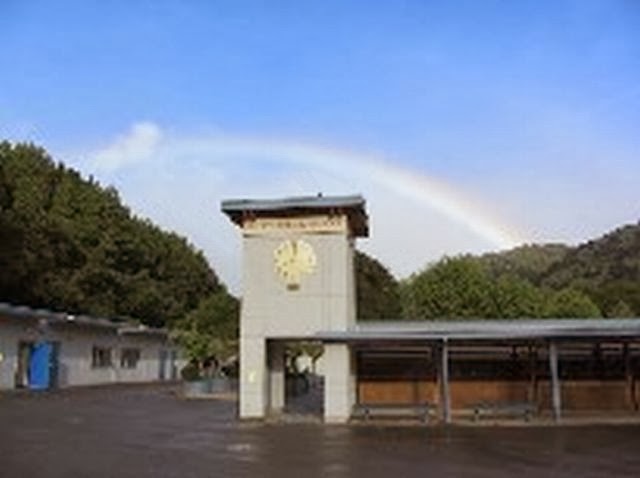
Miller Creek Middle School
Ms. Janai Meschery's and Mr. Ed Breece's 8th grade classes
Thursday, February 27, 2014
The Bob Zadek Show, Sunday, November 24, 2013
Link to Sunday's Bob Zadek Show: http://bobzadek.com/?powerpress_pinw=2599-podcast
Bob Zadek reviews current events from a purely Libertarian perspective. Small, unobtrusive government. Limited federal powers, with far more power vested in states and localities. Protection of property rights. End victimless crimes. Personal responsibility.
recent show
11/24 - George Washington Did Not Need Reverend Wright - In America we seem unable to resolve the proper Constitutional relationship between religion and our political life. We think we know what the founders intended: “separation of church and state,” “a wall of separation,” the Establishment Clause and the Free Exercise Clause. But this issue is far from resolved. Reagan did not attend church enough for some Americans, Romney’s Mormonism was an issue, and some take issue with Obama and Reverend Wright. Raymond Lorber’s first book, “George Washington’s Providence,” explores the unique relationship between Washington’s belief that his God would protect him and his military and political triumphs in a style that is both scholarly and accessible. Ray’s book gives us access to Washington’s many letters and other writings that offer us an understanding of Washington where most other writings fail. Most of us have wondered what qualities separated our founders from those who followed them. This book provides the answer, at least insofar as Washington is concerned. Join Ray and Bob on Sunday at noon find out more about Washington and America.
Fred W. Smith National Library for the Study of George Washington at Mount Vernon
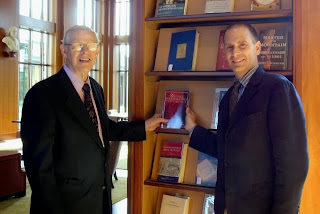
Raymond G. Lorber, author and Mark Santangelo, Chief Librarian and Archivist, place George Washington's Providence on the book shelf in the Fred W. Smith National Library for the study of George Washington at Mount Vernon.
Meeting with the 8th Grade class at Holy Redeemer School
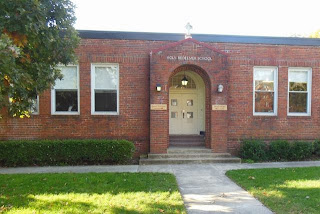
While visiting in the Washington, D. C. area I scheduled a visit to my alma mater, Holy Redeemer School in Berwyn, MD.
They invited me to present to the 8th grade class on George Washington's Providence and the life of George Washington.
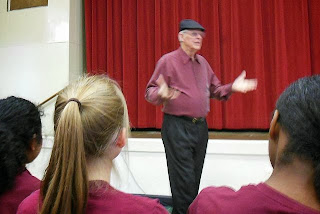
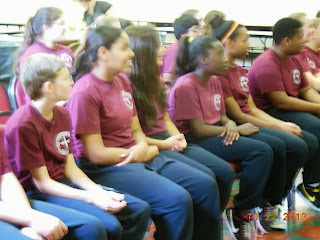
Students in the 8th grade class listening to the lecture of George Washington.
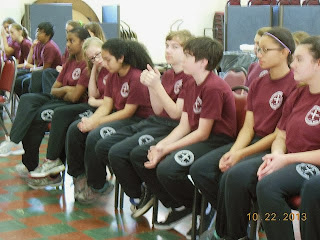
Marin History Museum - Author Spotlight Series
The Marin History Museum Author Spotlight Series Presents: RAYMOND G. LORBER ”George Washington’s Providence” Author Chat, Insight + Book Signing
Mr. Lorber is donating 100% of today’s book sales to the Marin History Museum!
George Washington's Providence is an entertaining and enlightening new book that follows the amazing survivability of one of our country’s most historical figures. Filled with factual and proven information, this illuminating book shows us all why Washington truly thought he was protected by Providence. Documenting his close brushes with death not only on the battlefield but with the major diseases of his time, this wonderful book provides readers with the backstory and reasoning as to how and why he believed Providence was the answer. Recommended reading to everyone who wants to broaden their knowledge about our country, our history, our forefathers and so many interesting dimensions of George Washington.
ABOUT THE AUTHOR: After retiring in 2002, Raymond G. Lorber dedicated over ten years of research as an opsimath. He attended the University of Maryland in College Park, Maryland, where he received his bachelor’s in finance before attending Golden Gate University in San Francisco, California, where he received his master’s in human relations and organizational behavior. Lorber currently resides in Marin County, California, with his beloved wife.
Lorber has been honored with an invitation to present his work to The Fred W. Smith National Library for the study of George Washington at Mount Vernon on October 23.
In the meantime, pull up a seat and join us on October 12. No reservation required.
Many thanks to the San Rafael Elks Lodge for allowing the Marin History Museum use of their facility!
September 20th, 2013
George Washington's Providence has been accepted by The Fred W. Smith National Library for the study of George Washington at Mount Vernon.
I will be meeting with Mark Santangelo the Chief Librarian and Archivist on Wednesday, October 23, 2013.
This is truly an exciting day.
Link to the Library: http://www.mountvernon.org/library/
September 2nd, 2013
I am a firm believer that the best way to provide information is to present it in story form. Accordingly George Washington's Providence is a compilation of stories reflecting life as George Washington experienced it.
For example, his difficulties in leading the Virginia Regiment in the western Virginia frontier is presented in a lengthy letter that he wrote to Lord Loudoun. His description of the regiment's difficulties far exceed any description that I could have conjured up. Washington lived the difficulties and his description of life during their campaign tells a bitter story of survival while their leaders failed to comprehend their plight.
Using the letter written by George Washington not only provides accuracy but also provides poignancy. This hopefully provides the reader with a more vivid reading experience and a much better understanding of the obstacles Washington experienced.
George Washington's Providence Reviews on Amazon
3 of 3 people found the following review helpful 5.0 out of 5 stars GW Providence comments, July 31, 2013
By Barb - See all my reviews This review is from: George Washington's Providence (Paperback)
George Washington's Providence is a comprehensive, thorough, deep and broad presentation of George Washington's life and challenges. The author has captured a perspective that no one else has done, and he demonstrates a passion and interest in this topic that everyone should read and share. Recommended reading to everyone who wants to broaden their knowledge about our country, our history, our forefathers and so many interesting dimensions of George Washington.
Help other customers find the most helpful reviews Was this review helpful to you? Yes No
5.0 out of 5 stars George Washington's Providence, July 30, 2013
By Joan - See all my reviews This review is from: George Washington's Providence (Paperback)
In documenting devine protection against Washington's close brushes with death, not only on the battlefield, but with major diseases of his time, this book provides background and reasoning as to how and why Washington believed in providential intervention. I cannot help but also believe that this man was destined for great things, and would be preserved, defying all odds, to be in the right place at the right time. After reading Washington's history in this book, it would be impossible to visualize anyone other than this great man filling the part of the first president of this newly formed democracy. Although he was idolized by the people of this country, who would have made him king; he refused a crown. This book is an in-depth and educational journey into the life and trials of George Washington, as farmer, general, and as the first president of this fledgling country and the attempt by Washington and the founding fathers to form a free and democratic government. I found this book to be a very illuminating resource regarding divine intervention in Washington's brushes with death; destining him for the future role as first president of the United States
Help other customers find the most helpful reviews Was this review helpful to you? Yes No
1 of 1 people found the following review helpful
5.0 out of 5 stars A Strong Debut, August 21, 2013
By L7Piper (Novato, CA USA)- See all my reviews This review is from: George Washington's Providence (Paperback)
In his debut book, Raymond Lorber has written a definitive work on George Washington. George Washington's Providence is an original, meticulously-researched study of a little-known aspect of Washington's life. Lorber's premise is that, although Washington experienced myriad life-threatening episodes over many decades, he was protected by a higher power ("Providence") in order to fulfill his destiny of greatness. Lorber makes a compelling case for his premise through extensive documentation and analysis of original sources such as letters and diaries written by Washington's contemporaries and by Washington himself. The actual words written by historical figures are fascinating and make history come alive for the reader. This is a serious book that should greatly appeal to history buffs as well as to those interested in whether our lives are, indeed, guided by a higher power.
Help other customers find the most helpful reviews Was this review helpful to you? Yes No
5.0 out of 5 stars Left me wanting more, August 7, 2013
By Carolyn Lenert- See all my reviews This review is from: George Washington's Providence (Paperback)
G.W.'s Providence takes the reader back in time and through the extraordinary life of one of the Founding Fathers. In our times of intense change and renewal of democratic institutions, I found it very valuable to reflect upon the character, values and context of such a reciprocal era. One comes away from this careful work satisfied and yet longing for more. Everyone can relate...to a physical hardship, a career challenge, a confrontation with hierarchy, an attempt to create change, to action with honor under severe stress...for this account of Washington's life encompasses all this and much more.
Help other customers find the most helpful reviews Was this review helpful to you? Yes No
5.0 out of 5 stars Really get to know George Washington!, October 10, 2013
By haridarshan- See all my reviews Amazon Verified Purchase ( What's this? )
Absorbing, unique and well researched. Learn much more about George Washington, his insights, experiences, challenges, beliefs and what kept him determined for independence against the severest of odds. Take a journey to our daring past, our spirited beginnings. Enjoy this moving, insightful story of our well loved leader.
Help other customers find the most helpful reviews Was this review helpful to you? Yes No
5.0 out of 5 stars Exceptional Book on the Life of George Washington, October 1, 2013
By Kona Don- See all my reviews This review is from: George Washington's Providence (Paperback)
This is an exceptional book, probably unique, that documents many of the episodes in the life of George Washington. It tells of Washington's successes, failures and health issues that, with the protection and guidance of Providence, sustained him through his difficult times.
Today, with air travel, cell phones. modern medicine and the Internet, it is easy to forget how difficult life was back in Washington's time. This book recalls those times when traveling took days, weeks or months depending on the weather and lack of good roads. Communications were hand written and delivered by courier, taking an equally long time. The author, Mr. Lorber, does not rely on hearsay, rumors or myths but diligently tells his story with accuracy and facts, supported by correspondence written by Washington himself and several of Washington's associates.
For anyone, who is interested in the life of George Washington or that period in American history, this book is a must read and a welcomed addition to his or her personal library.
Help other customers find the most helpful reviews Was this review helpful to you? Yes No
Introduction
Against all odds, George Washington lived to fulfill his belief that with a protecting and guiding Providence he would fulfill his destiny of greatness. At a time when the median age was sixteen, Washington, remarkably, lived to the advanced age of sixty-seven even though he suffered several life-threatening diseases and, on multiple occasions, faced enemy fire when he led his troops into battle. He attributed his long life to Providence which reinforced his conviction that he was to accomplish a grand endeavor. This proved prescient given that he fostered the world’s first modern democracy and became renowned as the Father of our Country.
Chapter Timeline
| Chapter | Event | Date | Age |
|---|---|---|---|
| 1 | George Washington is born | Feb. 22, 1732 | |
| 1 | GW's father, Gus dies at age 48 | 1743 | 11 |
| 1 | George Washington contracts malaria | 1749 | 17 |
| 1 | George Washington accompanies half-brother Lawrence to Barbados and contracts smallpox | 1751 | 19 |
| 1 | George Washington contracts TB | 1752 | 20 |
| 2 | George Washington survives Indian assassination attempt | Dec. 27, 1753 | 21 |
| 2 | George Washington nearly drowns crossing the Allegheny River | Dec. 29, 1753 | 21 |
| 3 | George Washington experiences his first battle at Jumonville Glen | May 23, 1754 | 22 |
| 3 | GW surrenders Ft. Necessity | July 3, 1754 | 22 |
| 4 | GW survives General Braddock's Battle of the Wilderness | July 12, 1755 | 23 |
| 5 | During General Forbes' march to Fort Duquesne, GW halted a friendly firefight | Nov. 12, 1758 | 26 |
| George Washington marries Martha | Jan. 6, 1759 | 26 | |
| 6 | George Washington appointed Commander in Chief | July 16, 1775 | 43 |
| 6 | General Howe evacuates Boston | Mar. 17, 1776 | 44 |
| 6 | Declaration of Independence signed | July 4, 1776 | 44 |
| 6 | General Howe returns to America and defeats GW in the Battle of Long Island | Aug. 27, 1776 | 44 |
| 7 | Battle of Princeton - GW leads Americans against the British | Jan. 3, 1777 | 45 |
| 8 | Battle of Monmouth - GW leads Americans against the British | June 28, 1778 | 46 |
| George Washington dies at age 67 | Dec. 14, 1799 | 67 |
Tony Kilgallin Show on Napa TV
Tony Kilgallin hosted a show
on July 11, 2013
featuring an introduction to
George Washington's Providence.
The link to watch the half hour show follows.
https://www.youtube.com/watch?v=a1xu87gT82sChapter excerpts
Excerpt from the Introduction
Washington’s lifelong hardiness was amazing—not only in battle but also in his frequent bouts with fatal infections. Therefore, the first chapter is committed to the little-known but horrendous struggles against the many typically fatal illnesses that Washington endured. Chapter one reviews Washington’s battles with lethal diseases that began in his teenage years and continued until his final episode at the age of sixty-seven. Research for this chapter was very challenging because the eighteenth-century medical community did not retain comprehensive medical records. Not having access to proper documentation, historians and authors have frequently reported incorrectly on the state of Washington’s health. To provide a credible account, only illnesses described by Washington himself and his correspondents who had first hand knowledge are included.
Excerpt from Chapter One - The Grim King
As a youth, Washington displayed a rugged strength. At the age of sixteen, he joined George William Fairfax on a surveying expedition in the mountains of Virginia’s western frontier and along the South Branch of the Potomac River. This very strenuous journey required great stamina. In March 1748 he wrote in his diary:
Tuesday 15th. We set out early with Intent to Run round the sd. Land but being taken in a Rain & it Increasing very fast obliged us to return. It clearing about one oClock & our time being too Precious to Loose we a second time ventured out & Worked hard till Night & then returnd…
Friday 18th. We Travell’d up about 35 Miles to Thomas Barwicks on Potomack here we found the River so excessively high by Reason of the Great Rains that had fallen up about the Allegany Mountains as they told us which was then bringing down the melted Snow & that it would not be fordable for severall Days it was then above Six foot Higher than usual & was Rising.
Monday 21st. We went over in a Canoe & Travell’d up Maryland side all the Day in a Continued Rain to Collo. Cresaps right against the Mouth of the South Branch about 40 Miles from Polks I believe the worst Road that ever was trod by Man or Beast.
The following year he received his commission and became a surveyor for Culpeper County. Throughout the summer he traveled vast distances surveying the wilderness of western Virginia, once again demonstrating his considerable strength and endurance while working this rugged mountainous frontier.
At the age of seventeen, while working the frontier, he contracted malaria. In the autumn of 1749, he wrote to his sister-in-law Anne Fairfax Washington that he was unable to visit because of his illness.
[September—November 1749] I heartily Congratulate you on the happy News of my Brothers safe arrival in health in England and am joy’d to hear that his stay is likely to be so short I hope you’l make Use of your Natural Resolution and contendness as they are the only Remedys to spend the time with ease & pleasure to yourself. I am deprived of the pleasure of waiting on you (as I expected) by Aguee and Feaver which I have had to Extremety since I left which has occasioned my Return D[own].
Excerpt from Chapter 5 - Between two fires
On November 11, General Forbes called a council of war with his commanding officers to discuss their campaign strategy. The challenge of battling the French into submission appeared daunting in light of the shortage of supplies and the deteriorating travel conditions. The attending officers recommended abandoning the pursuit of their objective for the season and Brigadier General John Forbes concurred. But the following evening, the enemy attacked Lieutenant Colonel George Mercer’s Virginia corps. Washington, upon hearing the intense fire, requested that he lead an additional detachment to reinforce Lieutenant Colonel Mercer. At twilight, with the light failing, Washington’s troops approached the scene of the battle. The two Virginia detachments mistakenly fired upon each other with devastating consequences. To stop the action, Washington placed his well-being in the hands of Providence and stepped in the line of fire. Using his sword, he struck up the weapons of his troops while commanding them to cease firing. Washington later described this encounter in 1786 while preparing his biography with David Humphreys, and expressed his feeling that this skirmish was his most life-threatening military encounter.
During the time the Army lay at Loyal haning, a circumstance occurred wch involved the life of G. W. in as much Jeopardy as it had ever been before or since the enemy sent out a large detachment to reconnoitre our Camp, and to ascertain our strength; in consequence of Intelligence that they were within 2 Miles of the Camp. a party commanded by Lt Colo. Mercer of the Virga line(a gallant & good Officer) was sent to dislodge them between whom a severe conflict & hot firing ensued which lasting some time & appearing to approach the Camp it was conceived that our party was yielding the ground upon which G. W. with permission of the Genl called (for dispatch) for Volunteers and immediately marched at their head to sustain, as was conjectured the retireing troops. led on by the firing till he came within less than a half a Mile, & it ceasing, he detached Scouts to investigate the cause & to communicate his approach to his friend Colo. Mercer advancing slowly in the meantime—But it being near dusk and the intelligence not having been fully dissiminated among Colo. Mercers Corps, and they taking us, for the enemy who had retreated approaching in another direction commenced a heavy fire upon the releiving party which drew fire in return in spite of all the exertions of the Oficers one of whom & several privates were killed and many wounded before a stop could be put to it. to accomplish which G. W. never was in more imminent danger. by being between two fires, knocking up with his sword the presented pieces.
Marin Voice: Celebrating George Washington’s character on Presidents Day

As we celebrate the 293rd birthday of the father of our country, I would like to note that George Washington’s strength of character is still portrayed as the standard for the office of the president of the United States of America. His character set the standard for honesty, courage, trustworthiness and respect.
Washington’s commitment to maintaining an admirable character is seen throughout his life. While in grade school, he wrote his “Rules of Civility and Decent Behaviour” document. In this notebook, he wrote 110 rules to govern his actions. Some of the rules he wrote pertain to his attention to maintaining a respectful character that all could admire. Here are a few:
Rule 1: “Every action in company ought to be with some sign of respect to those that are present.”
Rule 40: “Strive not with your superiors in argument, but always submit your judgment to others with modesty.”
Rule 56: “Associate yourself with men of good quality if you esteem your own reputation; for it is better to be alone than in bad company.”
Throughout his 67 years, he used these 110 rules to guide his behavior. It seems only appropriate to now share several examples of his actions that portray his honorable character.
Virginia Lt. Gov. Robert Dinwiddie sent 20-year-old Washington on a thousand-mile trek, through the wintry wilderness of western Virginia and Pennsylvania to deliver a note to a French commandant during the French and Indian War. The note demanded that the French leave British territory. The commandant refused to follow the British governor’s demands. On the return trip to Williamsburg someone, at point blank range, shot at Washington and missed. After Washington wrestled the gun away, he released the shooter (who was a native) and continued his return trek to Williamsburg. Washington, knowing that the French commandant inspired the attack, forgave the Indian and released him without retribution.
As president of the Constitutional Convention, Washington wisely advised the delegates: “If, to please the people we offer what we ourselves disapprove, how can we afterwards defend our work? Let us raise a standard to which the wise and honest can repair.”
While wintering in Valley Forge in 1777-78, Washington’s leadership was threatened. Gen. Horatio Gates had won a smashing victory at Saratoga and there was a movement to retire Washington and have Gates lead the army. Gen. Thomas Conway led the effort to retire Washington. During the Conway Cabal, Washington, having learned that there was a movement to overthrow him as commander in chief, addressed the officers involved. He met with those challenging his leadership and diffused the threatened takeover. Once again, Washington’s steadfast character provided the leadership needed to resolve this crisis.
During the events leading to the Battle of Monmouth Courthouse in the summer of 1778, Washington was confronted with conflicting advice from competing generals, Lafayette and Charles Lee. They disagreed on whether to attack the retreating British. Many of the generals supported Lee’s stance of not attacking the British. Washington accepted Lee’s request to lead the attack on the retreating British, even though Lee was opposed to the action. Washington respectfully selected Lee because of his seniority. It was the right decision to make. By supporting Lee, he minimized the potential of a threatened mutiny within his officer corps.”
In 1796, Washington delivered his final address to the people. It provides many examples of his concern for character. One in particular refers to his concern over the threat of political parties.
“However combinations or associations of the above description,” said Washington in reference to political parties, “may now and then answer popular ends, they are likely, in the course of time and things, to become potent engines, by which cunning, ambitious and unprincipled men will be enabled to subvert the power of the people and to usurp for themselves the reins of government, destroying afterwards the very engines which have lifted them to unjust dominion.”
Perpetuating his reputation for having a character of honesty and respect, Washington, in his final presidential speech to the American people, expressed his concern over the potentially destructive power of political parties.
Raymond G. Lorber, of San Rafael, is the author of “George Washington’s Providence.”